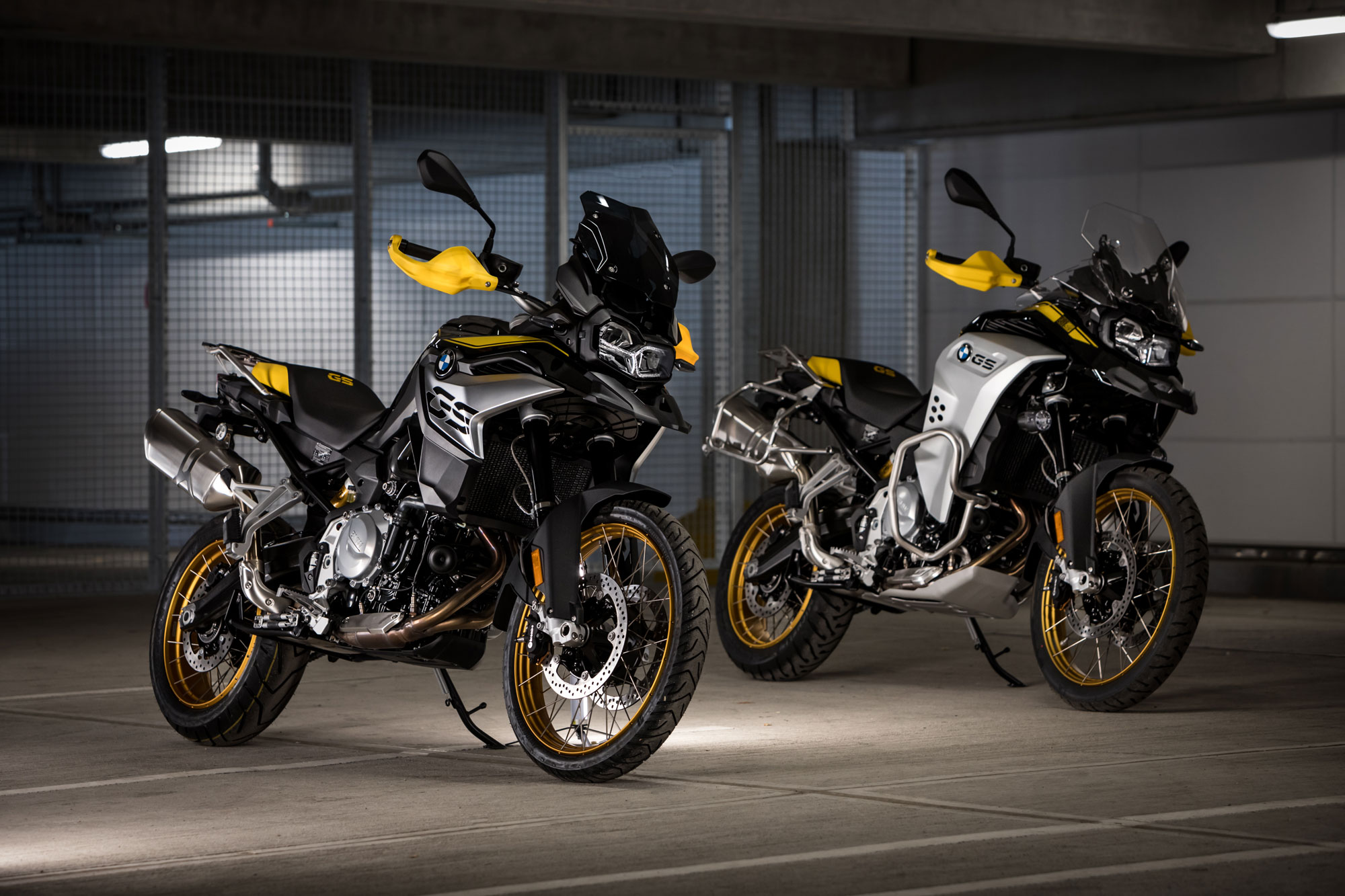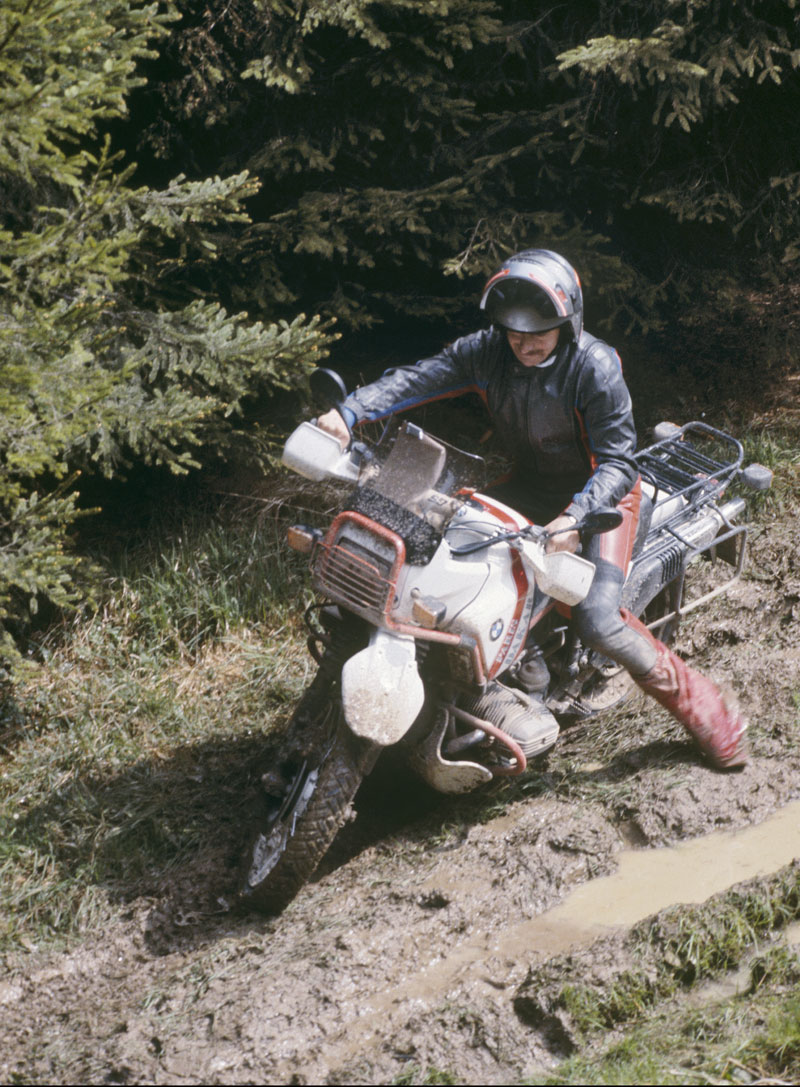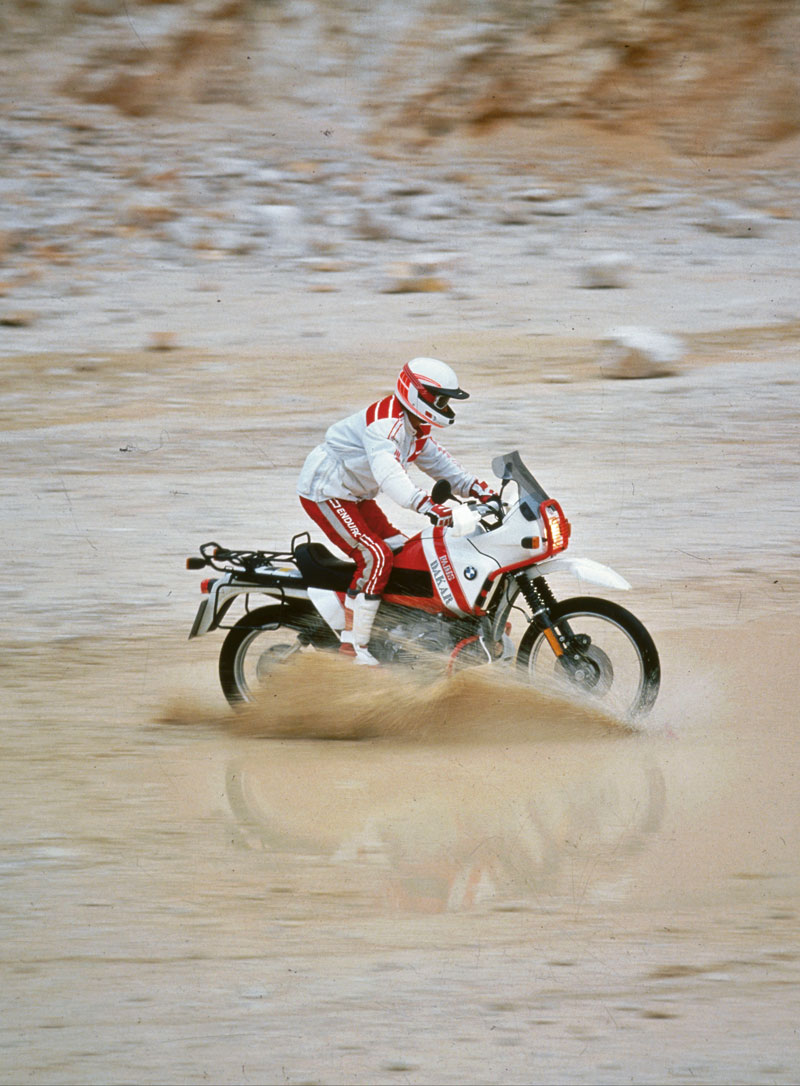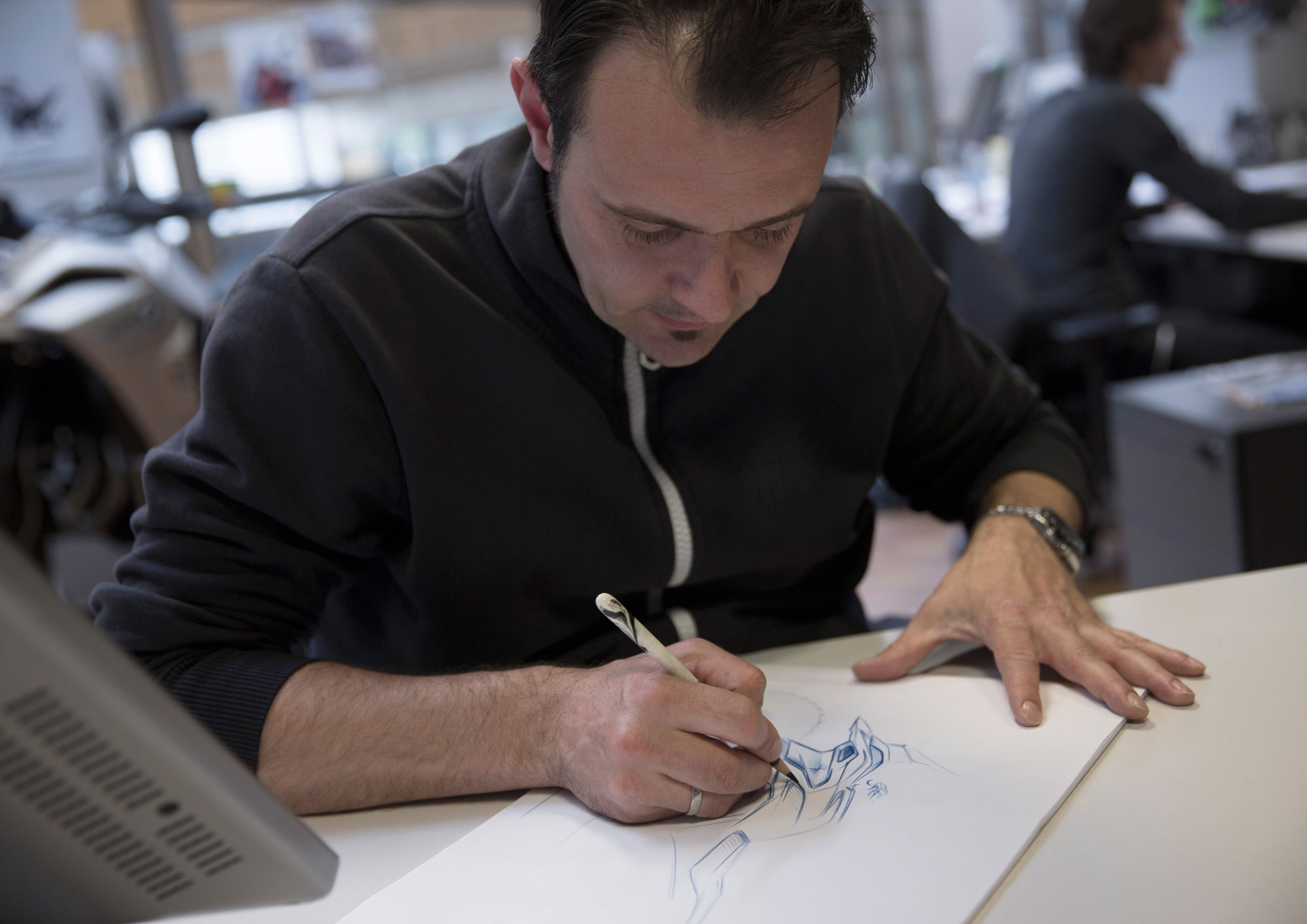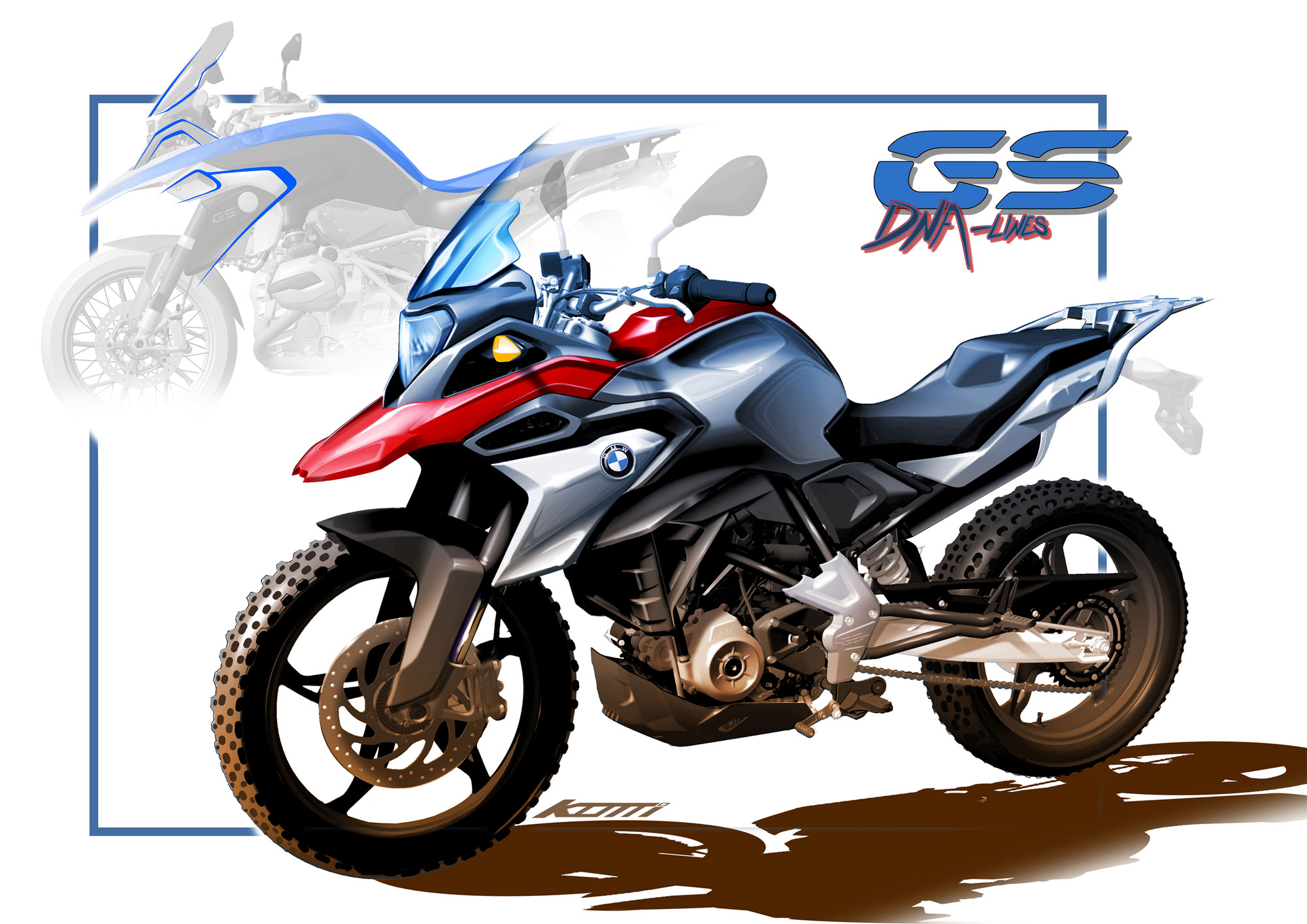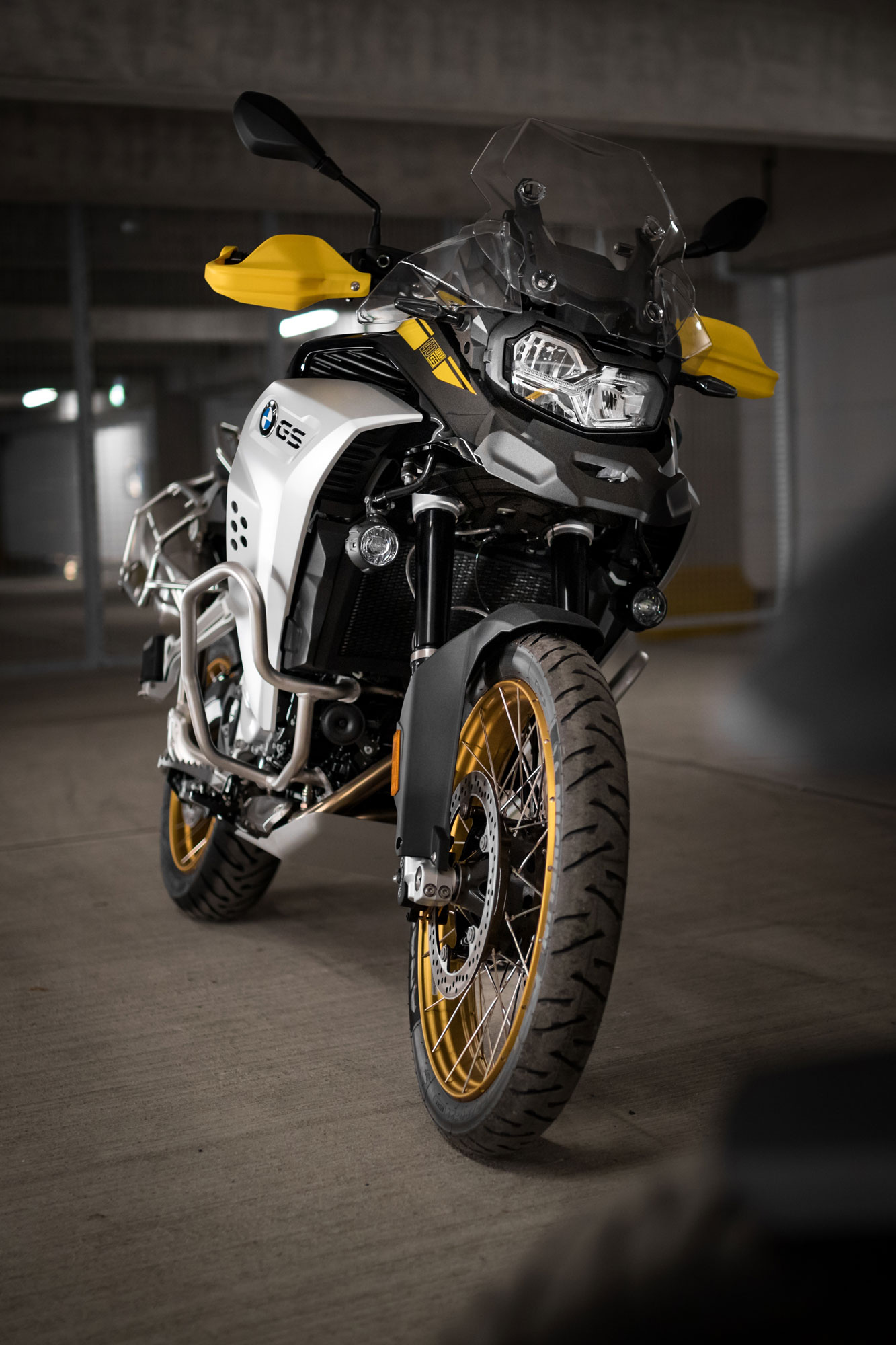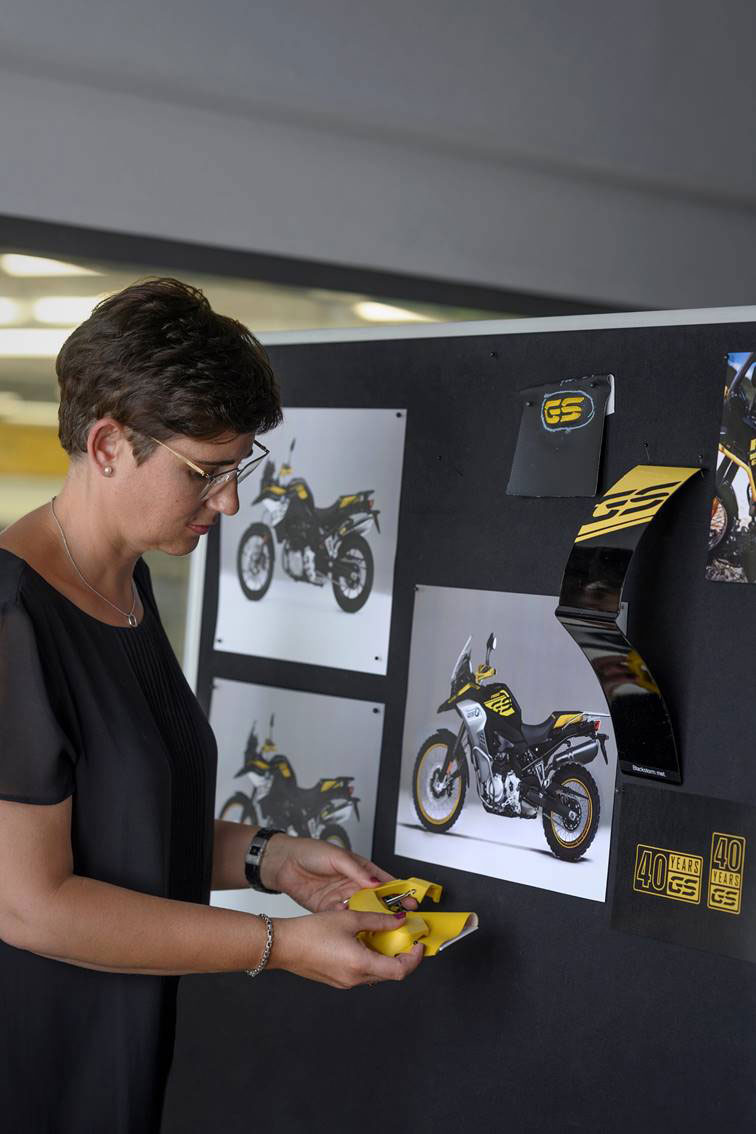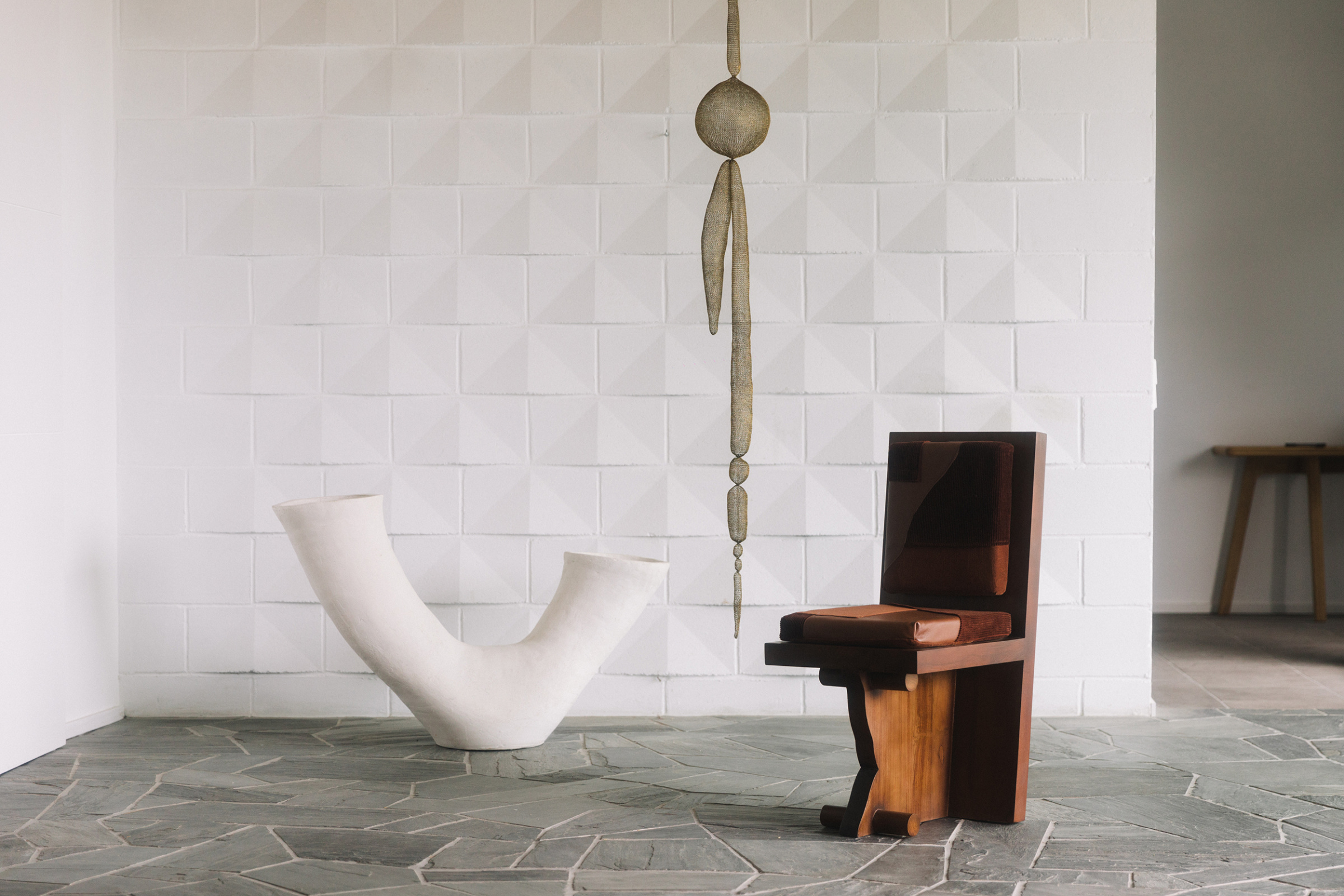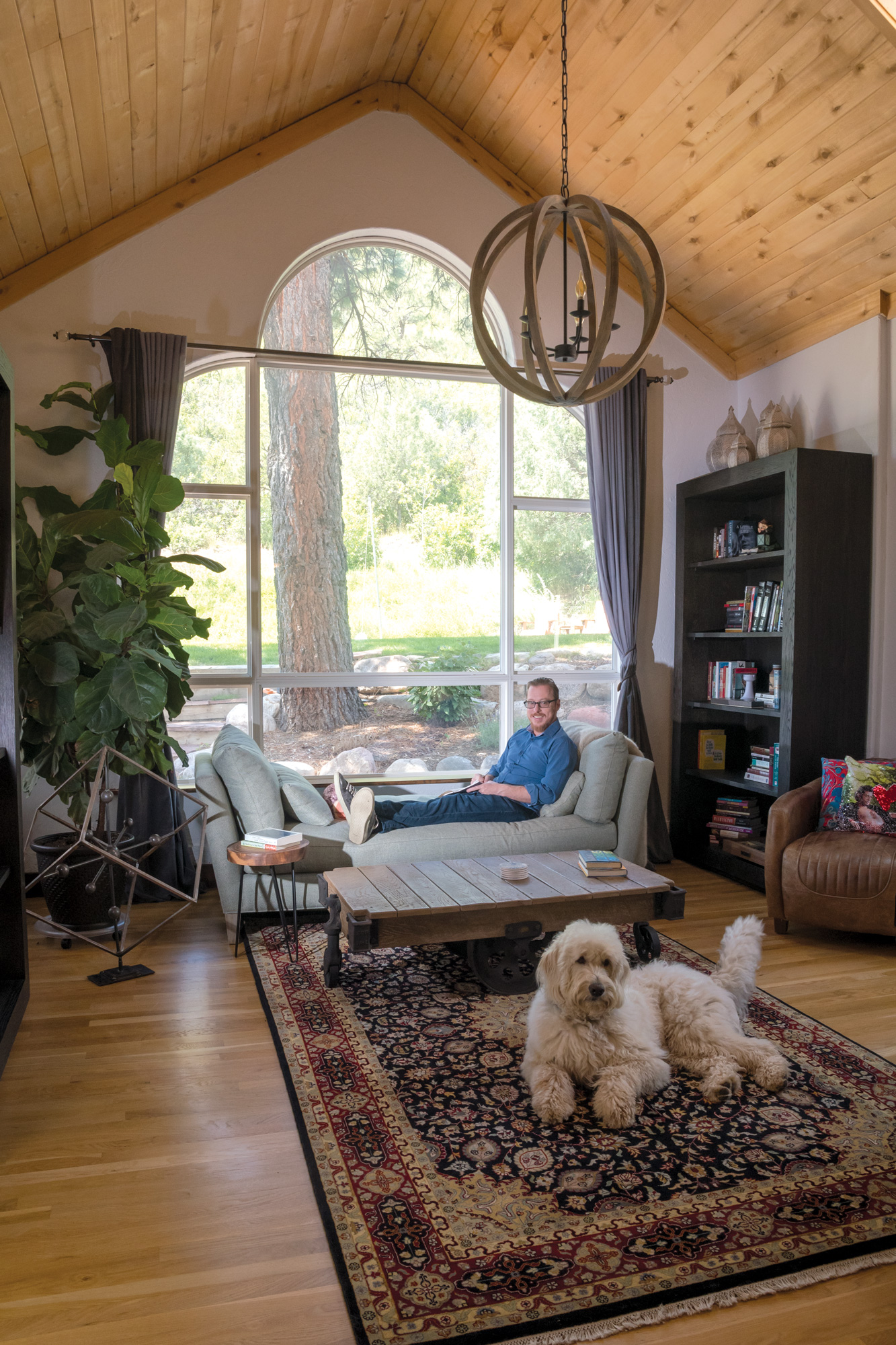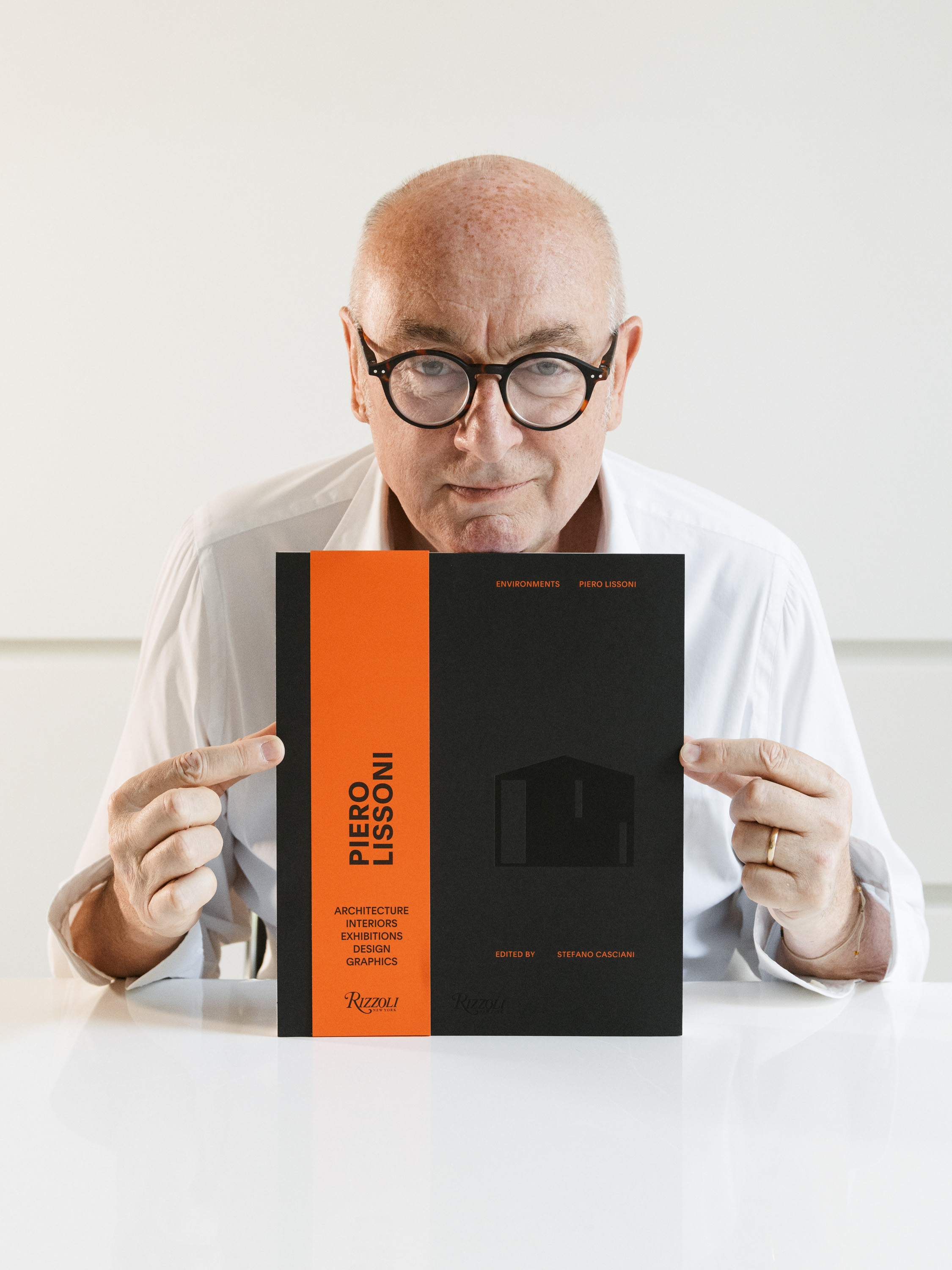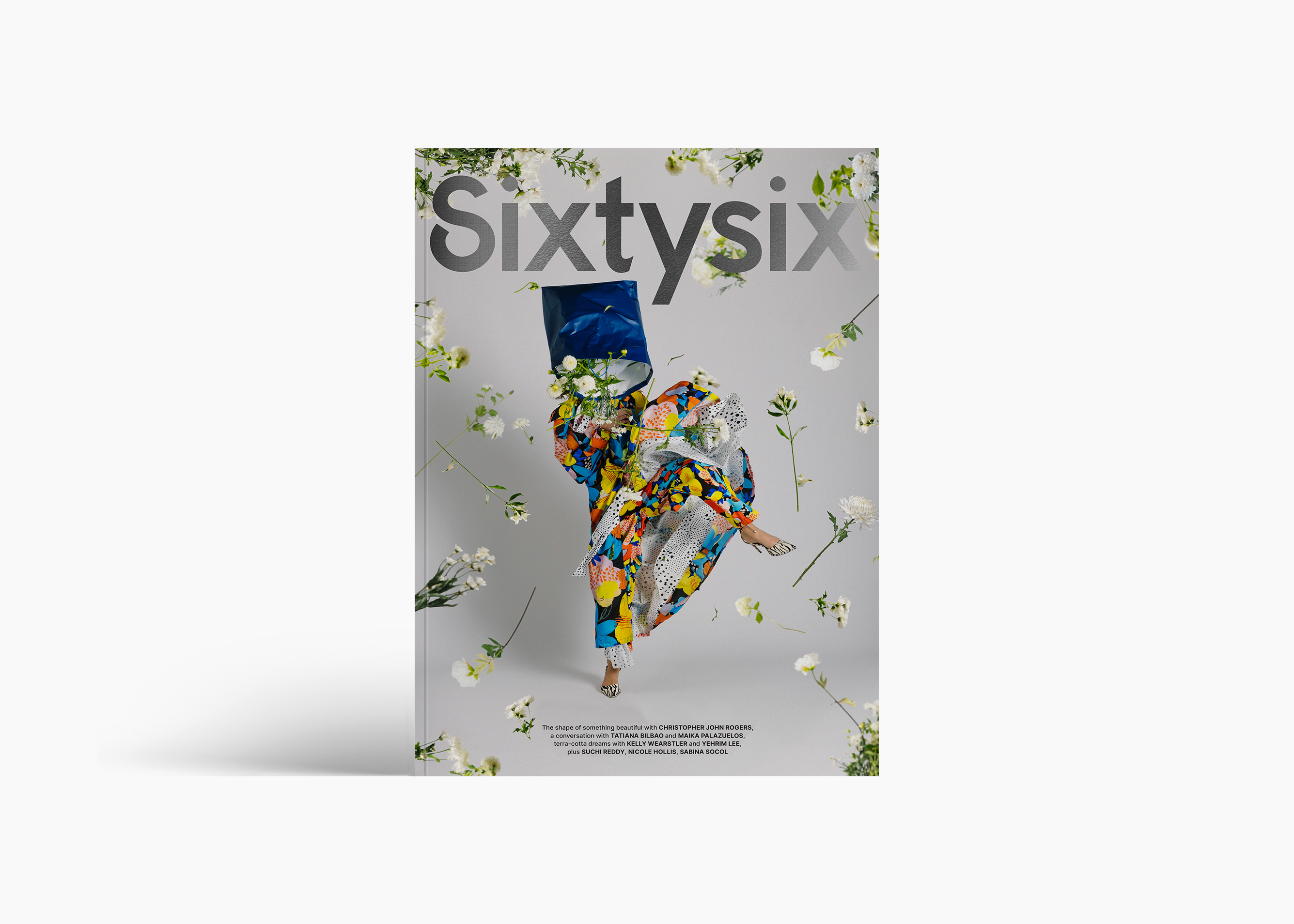This fall BMW celebrates 40 years of their GS (Gelände/Straße, German for off-road / road) models, a concept that changed the motorcycle world.
To celebrate we present a quick look at the design history of these legendary bikes, as well as an exclusive glimpse of the latest designs from the designer in charge of the new BMW 2021 GS lineup.
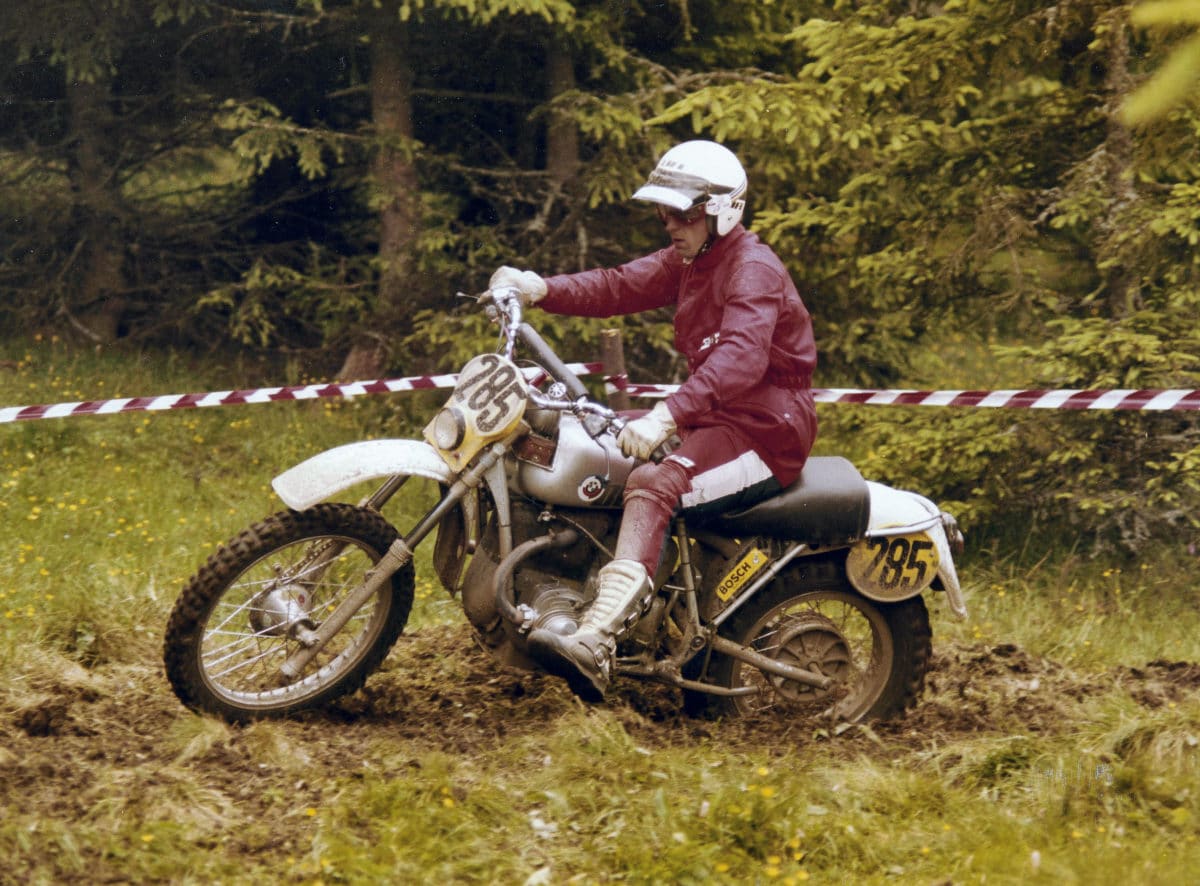
Lazio Perez riding the BMW GS 800 at the European Off-road Championship in 1978. Photo courtesy of BMW Motorrad
To tell the story of these famous German motorcycles we have to begin in Italy with a company called Laverda, whose roots date back to 1873. In the mid-1970s BMW turned to Laverda, then a key player in racing, to develop two prototype off-road racers.
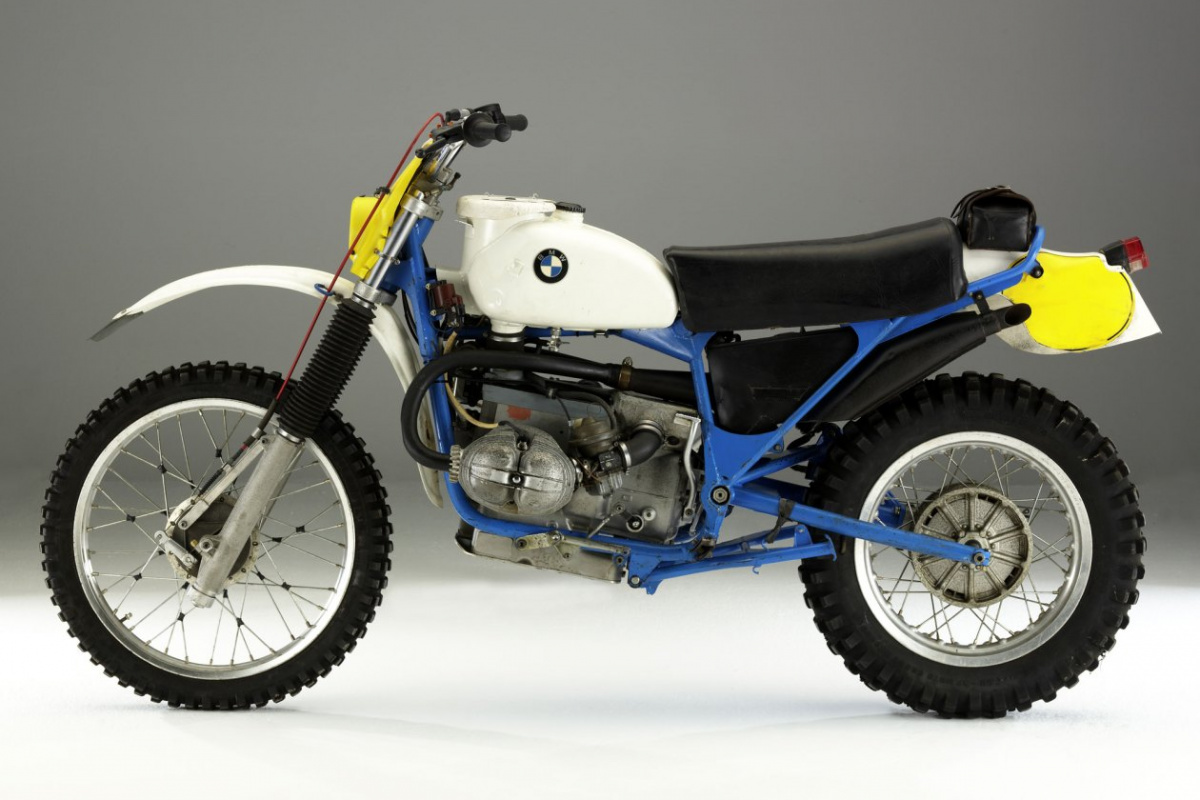
One of the first versions of the BMW GS.
The Italians took BMW’s R 60 motor and bored it out to 800CC, carved off weight where they could, and called it the GS 800.
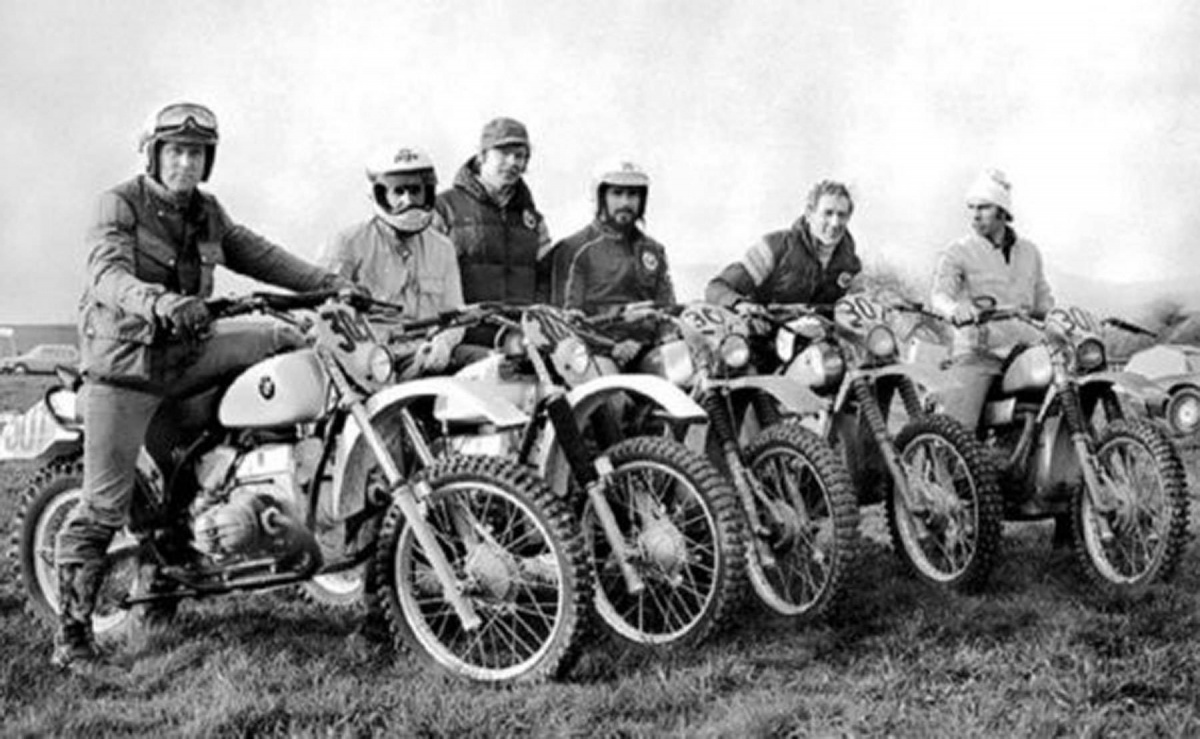
The 1979 BMW enduro team that competed in the FIM World Enduro Championship/ (Left to Right) Rolf Witthöft, Laszlo Peres, Dietmar Beinhauer (Teamchef), Kurt Fischer, Herbert Schek, Richard Schalber
Meanwhile, BMW’s in-house techs had their own ideas on how to tweak their bikes to get out into the dirt. BMW engineer Lazio Perez created the “Red Devil” prototype and hit the races.
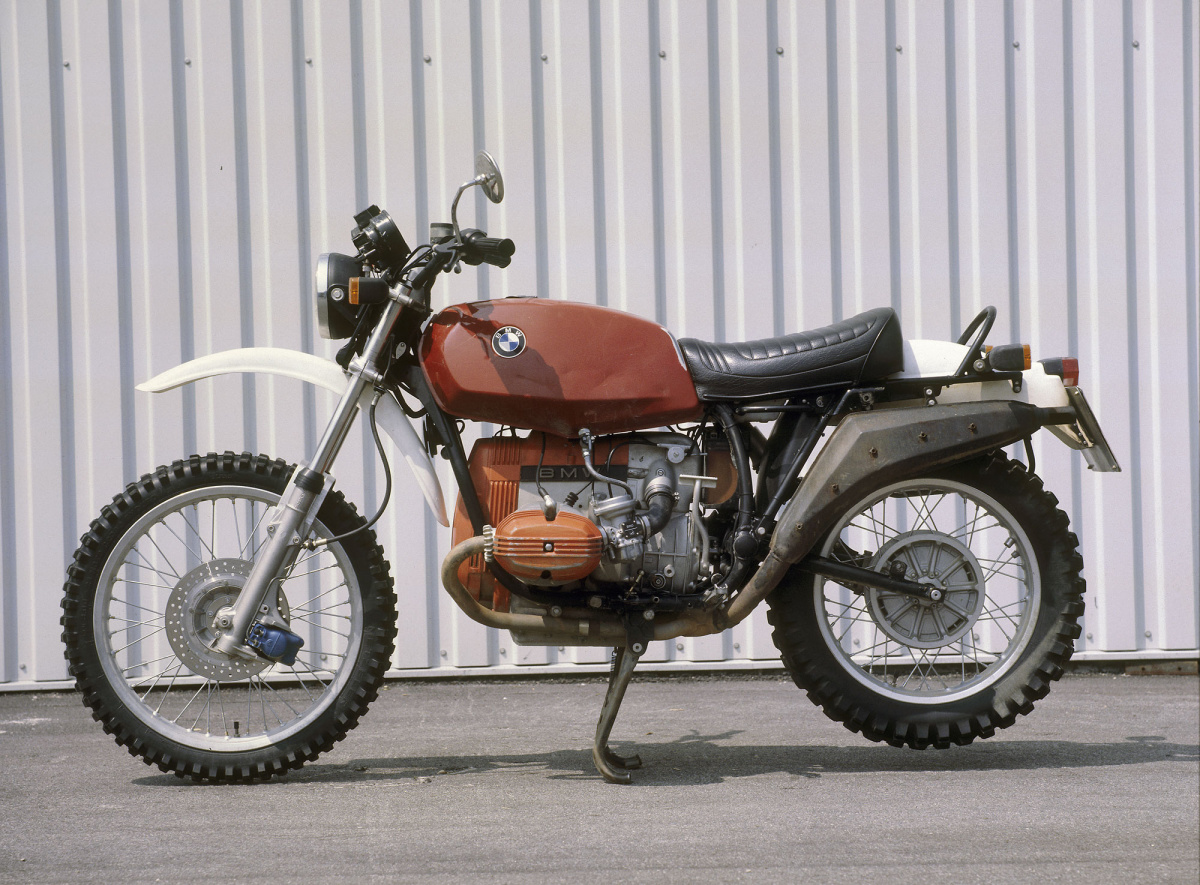
The “Red Devil” BMW R 80 G/S prototype. Photo courtesy BMW Motorrad
With a growing interest in racing, but underwhelmed by the engineering-driven looks of the Red Devil, BMW designer Hans Muth had an idea—what would a motorcycle version of a Range Rover look like? Something capable off-road but still comfortable? He began sketching what he called a “Gentleman’s Scrambler.”
[rp4wp]
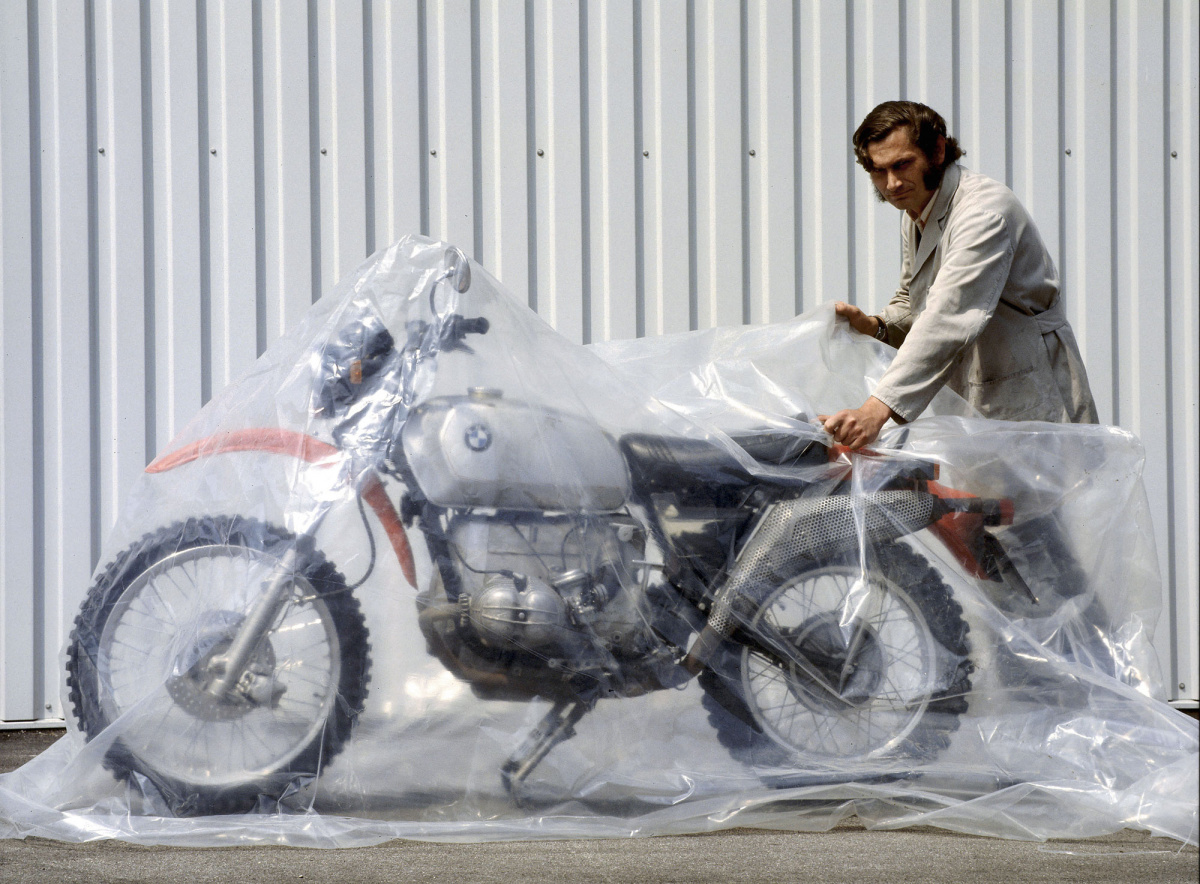
Another early BMW R 80 G/S prototype from 1979, this one with less red. Photo courtesy BMW Motorrad
While all of this is going on, Karl Heinz Gerlinger, then in charge of BMW Motorrad (BMW’s motorcycle division), was essentially given an ultimatum. Do something fast to make the failing motorcycle department profitable or shut it down.
With little time and a lot at stake, Gerlinger green lit a production version of the BMW R 80 G/S, and in the fall of 1979 the bike was presented to the public. It’s now considered the world’s first “adventure bike.” It was a white bike interpreted with the three colors of BMW’s M racing program; blue from the Bavarian flag, red from BMW’s early racing partnerships with Texaco, and purple—the color you get when the two brands mix. The bike, and its looks, would unexpectedly change the course of motorcycling forever.
1980 BMW R 80 G/S
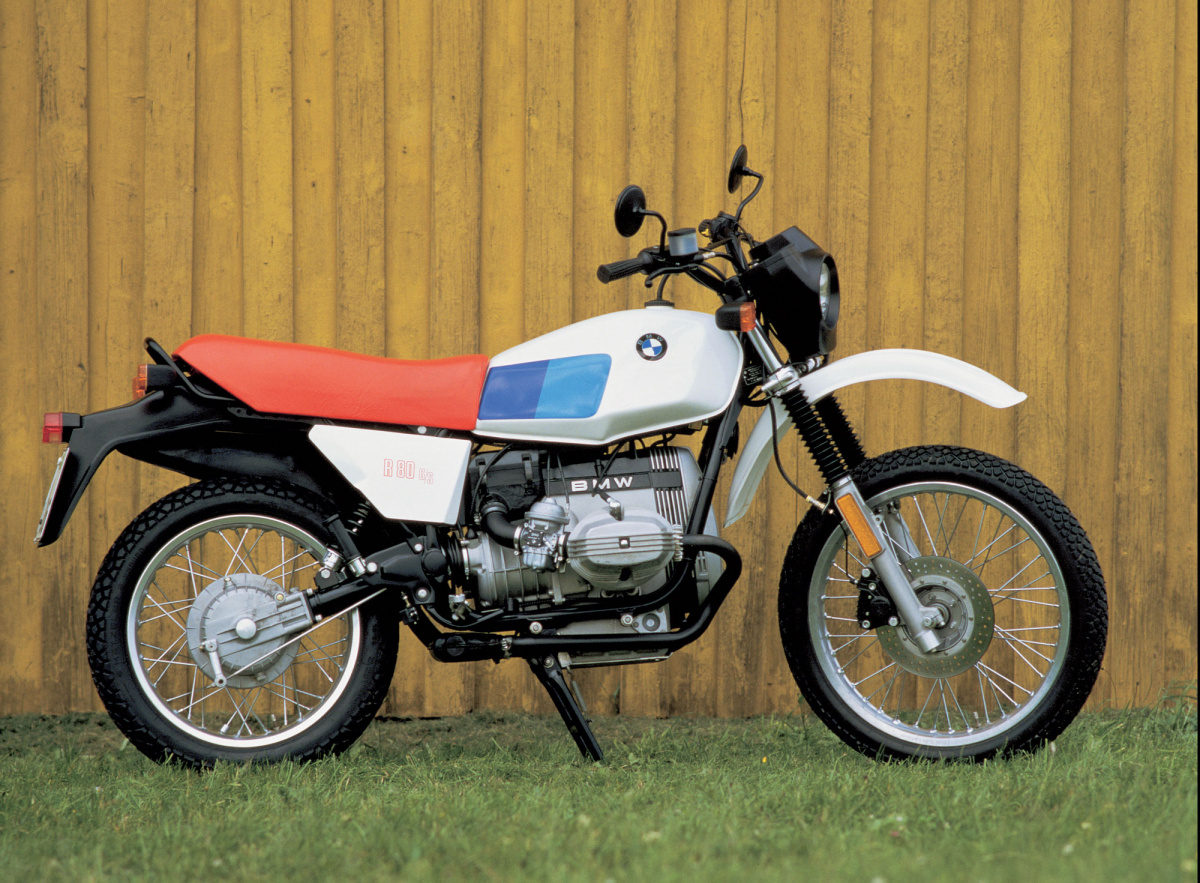
The 1980 BMW R 80 G/S in “M” Motorsport racing colors. The M stripes are Pantone Process Blue, Pantone 268, and Pantone Warm Red.
In 1981 Hubert Auriol won the insane Paris-Dakar rally, a largely off-road, two-week long, 6,000+ mile endurance race on a white BMW R 80 G/S with red and blue stripes and a brown saddle, complete with a matching racing suit and helmets. He finished a full three hours ahead of the next racer. The demand for the bike skyrocketed.
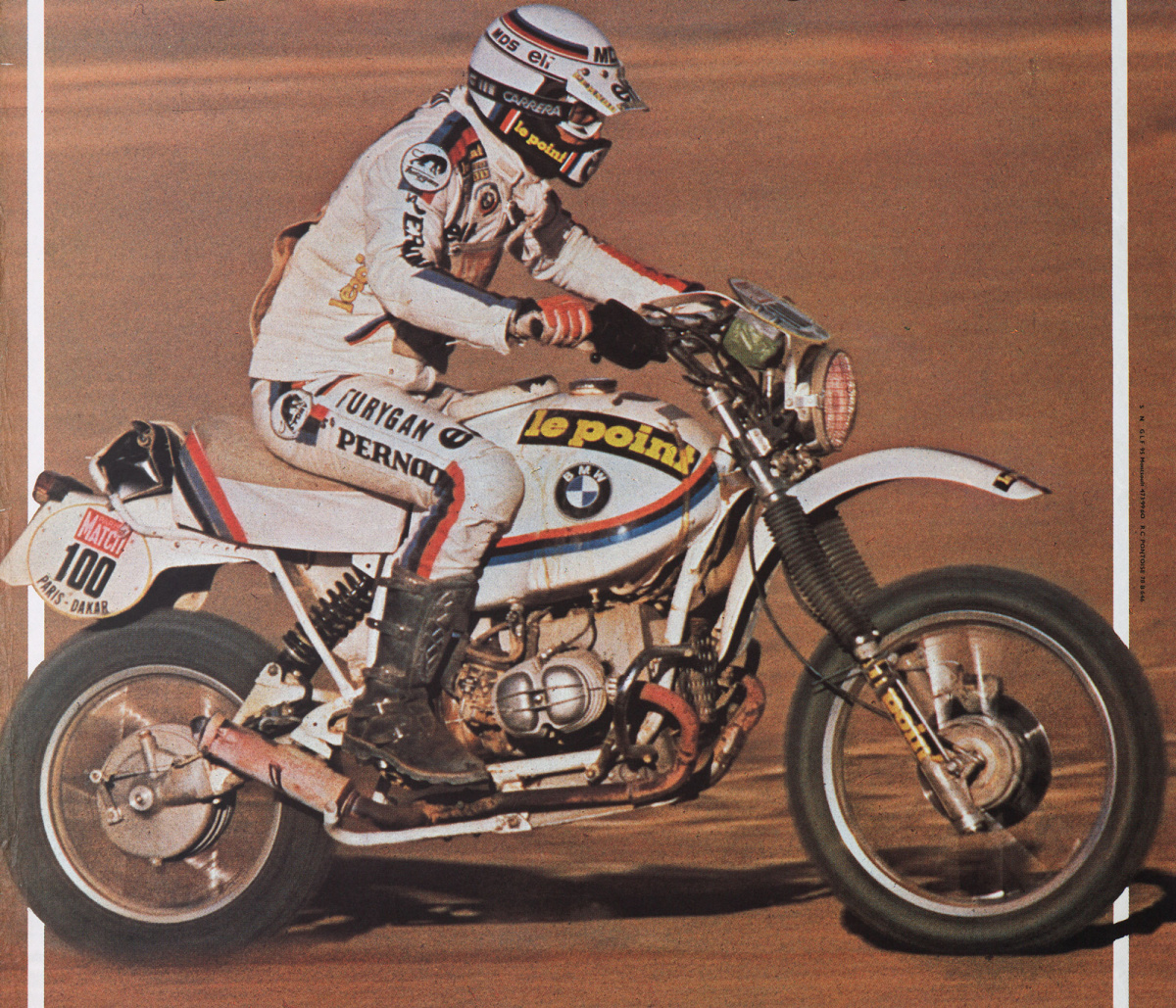
Hubert Auriol racing the Paris-Dakar rally on a 1981 BMW R 80 G/S. Photo courtesy BMW Motorrad
Racing the G/S proved to be a winning marketing formula for BMW. Auriol won the Dakar rally again in 1983 and finished second in 1984, just behind Gaston Rahier. What was Rahier riding? A white BMW R 80 G/S with blue, red, and purple M racing stripes.
1984 BMW R 80 G/S Paris Dakar
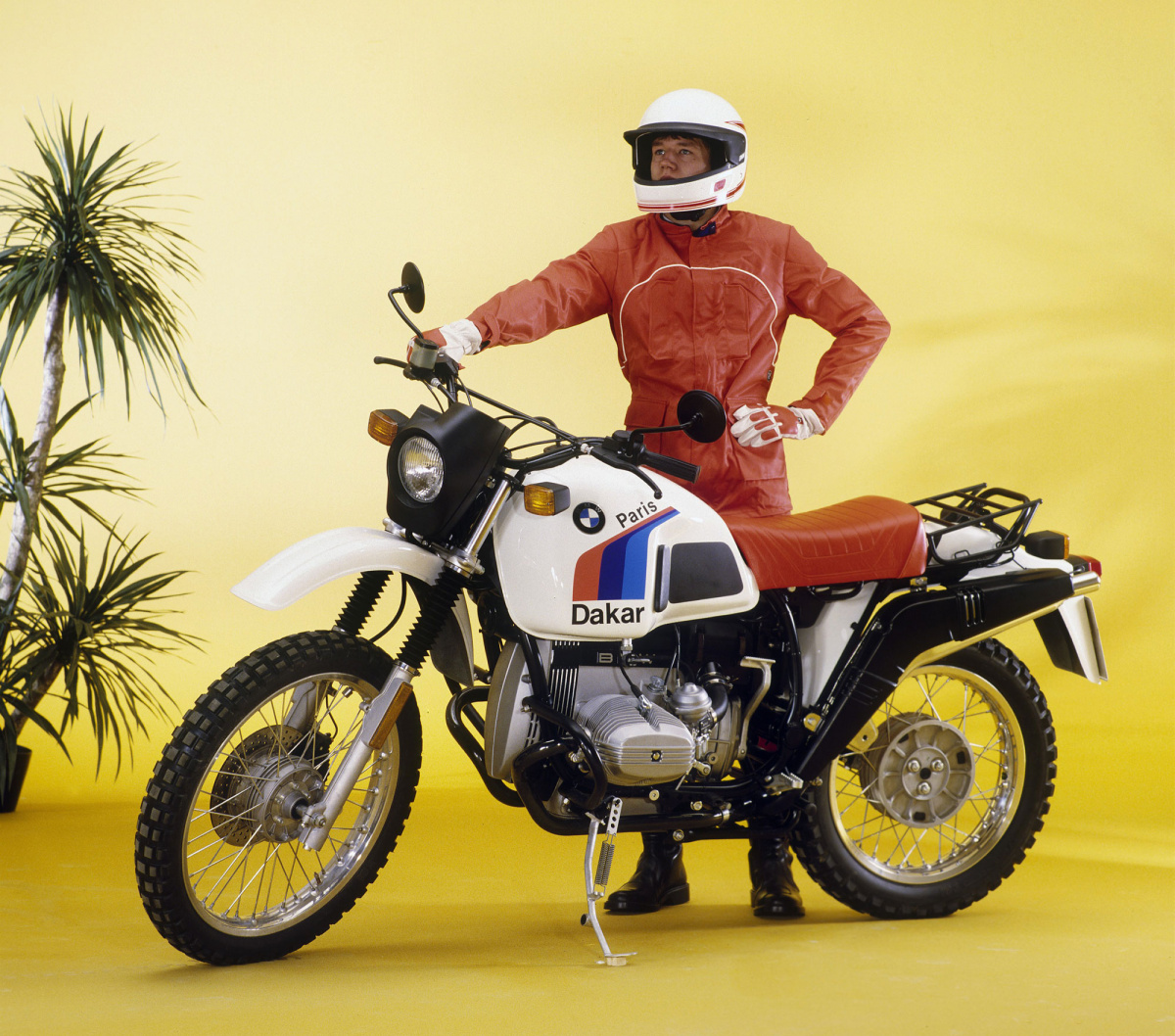
The special Paris-Dakar edition of the 1984 BMW R 80 G/S. Photo courtesy BMW Motorrad
To celebrate, a special edition 1984 BMW R 80 G/S Paris-Dakar edition was released. Designed after Rahier’s setup, it kept the solo brown saddle, racing stripes, protective bars, extra-large 8.5-gallon tank, and the bold sans-serif Paris-Dakar livery. They sold more than 3,000 of them and coined the “Dakar” look.
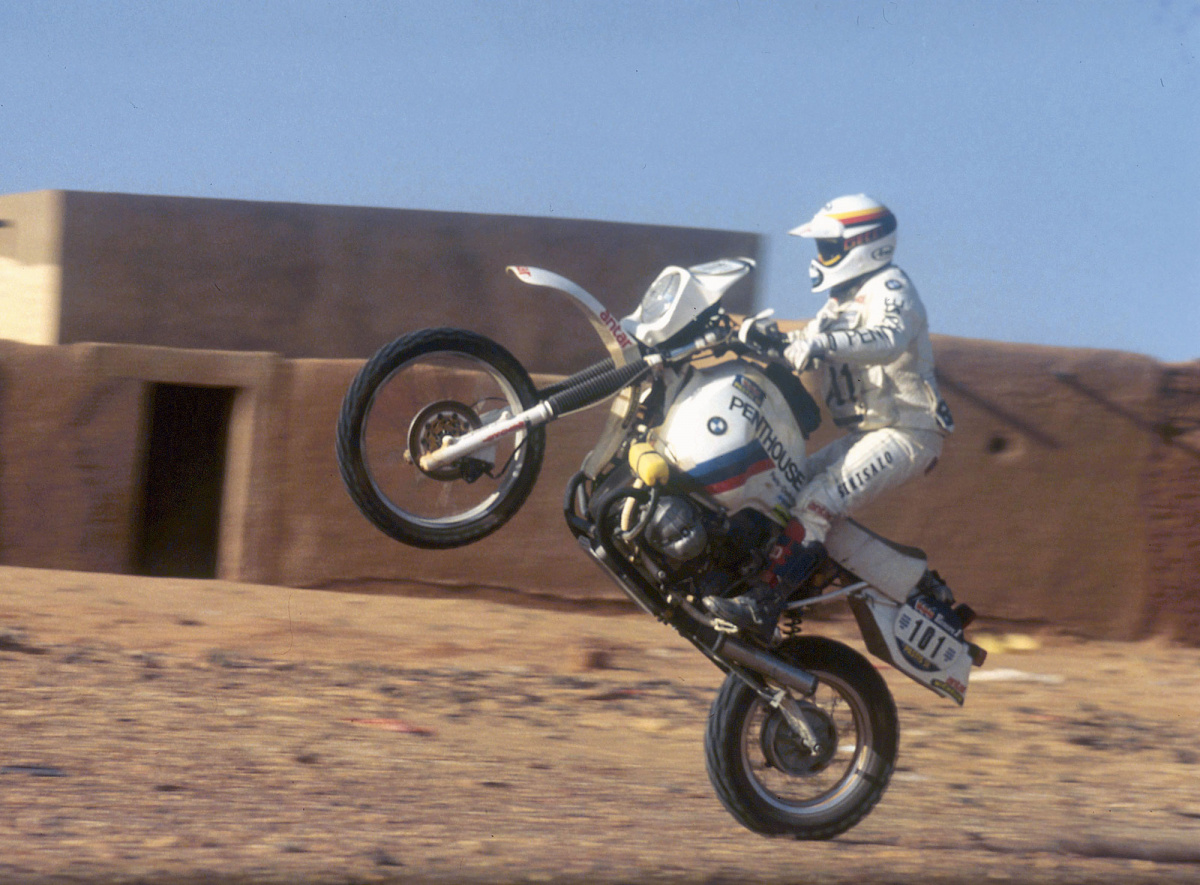
Gaston Rahier riding a BMW R 80 G/S at the Paris Dakar rally in 1984. Photo courtesy BMW Motorrrad
By 1987 the company sold nearly 22,000 units. The R 80 G/S had become a worldwide sensation.
1987 BMW R 65 GS
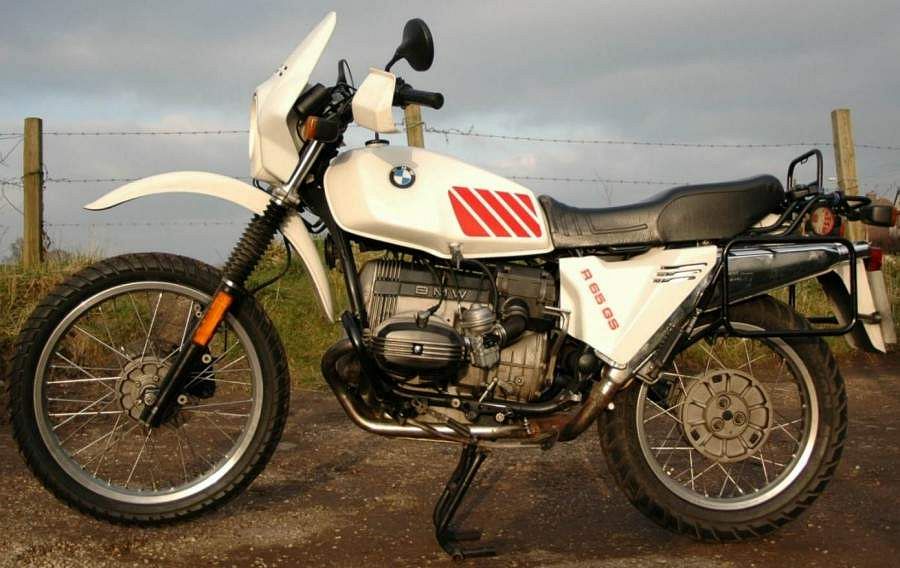
The 1987 BMW R 65 GS. Less than 2,000 were produced by using the engine from the R 65 and fitting it into the R 80 G/S frame.
Around this time West Germany banned motorcycles that produced more than 27 horsepower. BMW again turned to Hans Muth to design a smaller more urban version of the GS with an exclusive tank design. In December 1987 the R65 GS went on sale and was produced until 1991.
1988 BMW R 100 GS
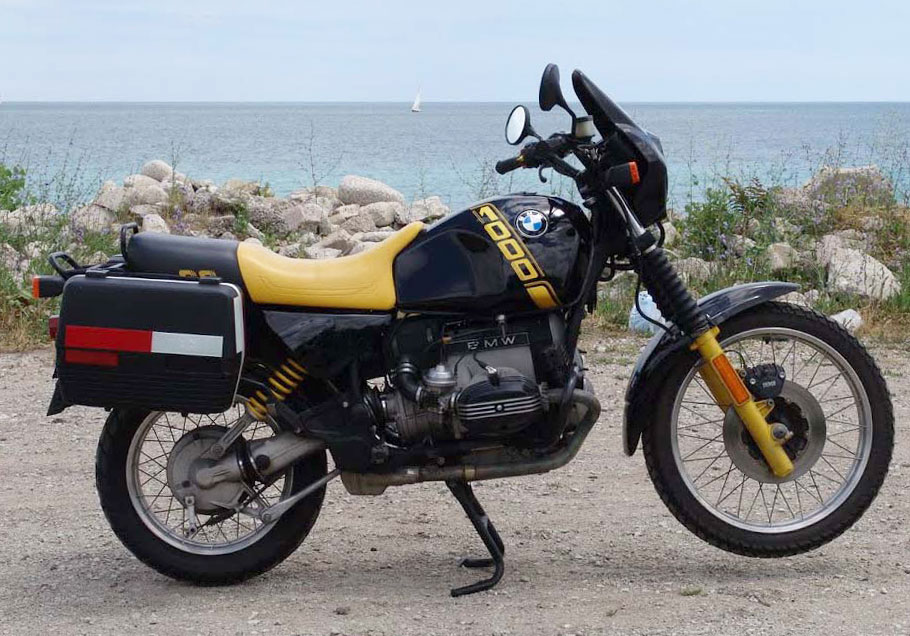
The 1988 BMW R 100 GS in black and yellow, better knows as “bumblebee.” This version was more road orientated, shown here with hard luggage cases and low fender.
Demands and suggestions for the bike came flooding in. In late 1987 BMW announced that in addition to improving the technical specs of the R80 G/S they would be releasing a bigger, faster, and more street-oriented version, the R 100 GS in a bold black and yellow “bumblebee” livery. The bike also had less punctuation, dropping the slash in GS.
1990 BMW R 100 GS Paris-Dakar
The BMW R 100 GS continued to grow in popularity, with private racers continuing to bring them to race Dakar. In 1990 Dakar rally versions were released in a Marakesh red, then with Carica blue, (otherwise known as purple), flash green, and several variations to follow. The model ran until 1996, selling more than 45,000 units.
- Photos courtesy BMW Motorrad.
- The 1990 BMW R 100 GS Paris-Dakar.
1994 BMW R 1100 GS
In September 1993 BMW launched the BMW R 1100 GS, with bold ’90s color choices, including a version with a bright yellow saddle and a large weird-looking “snout” mudguard. The bike was loaded with technological improvements and an all-new chassis and an oil-cooled engine.
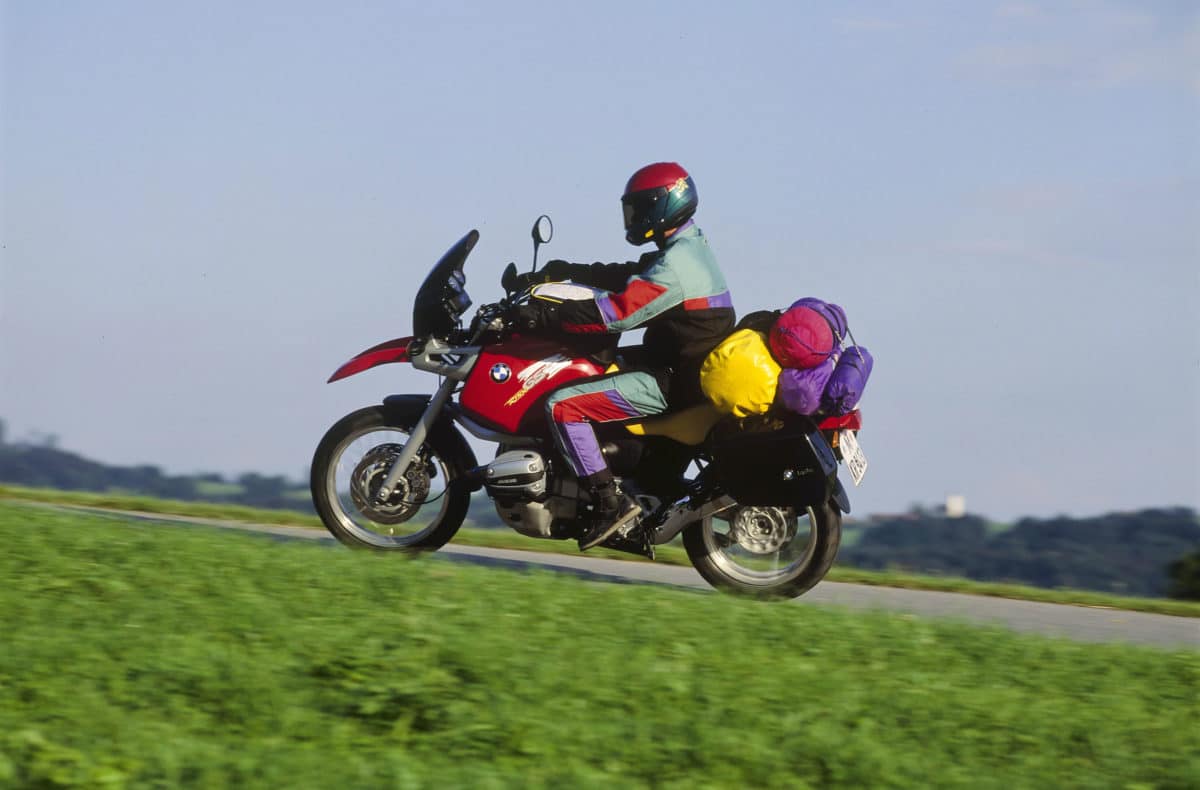
The very ’90s 1994 BMW R 1100 GS in red with a yellow saddle. Photo courtesy BMW Motorrad
1996 BMW R 850 GS
So now what does BMW do? Make more GS models, of course! Enter the BMW 1996 R 850 GS with a smaller engine. It was discontinued in 2000.
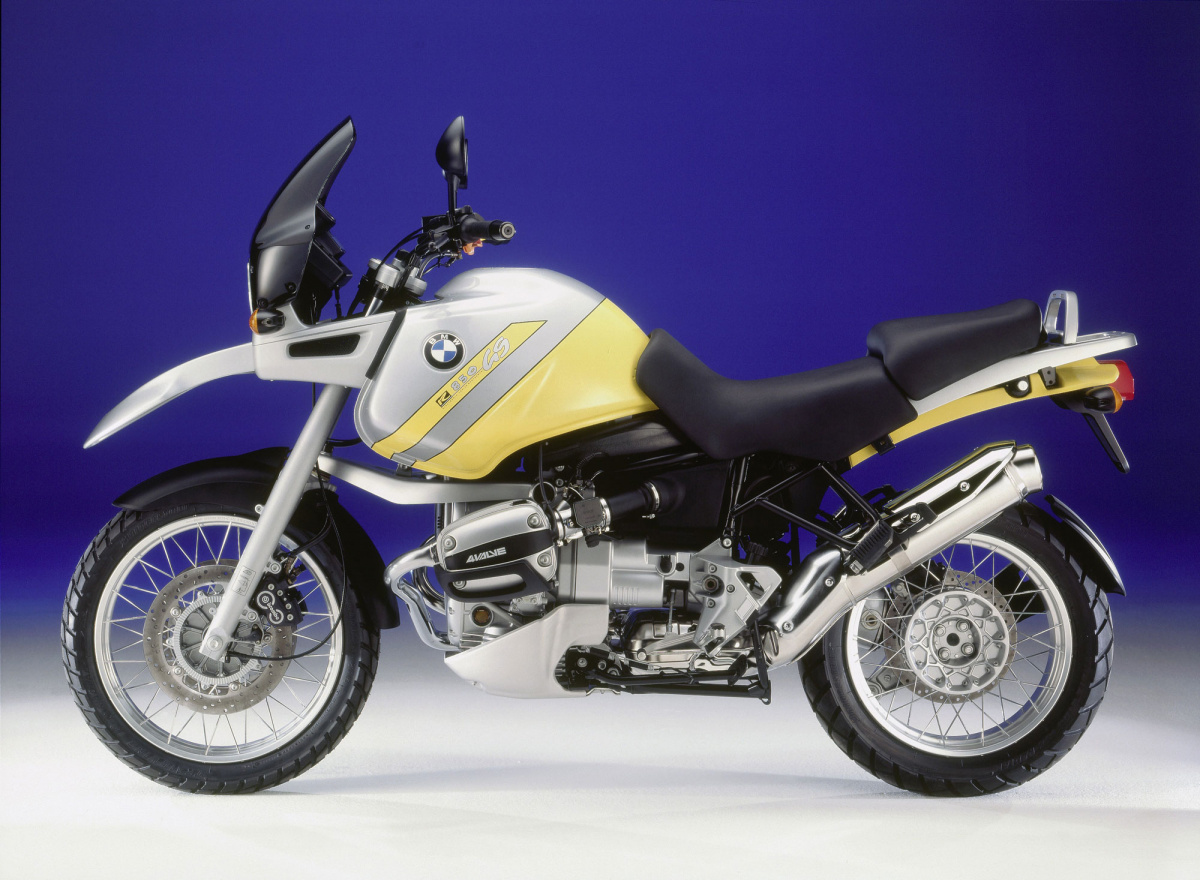
The 1996 BMW R 850 GS in yellow. Cosmetically it was nearly identical to the R 1100 GS. Photo courtesy BMW Motorrad
1997 BMW R 80 GS Basic
While most riders loved the new tech, some loyalists were already missing the original R 80 G/S. BMW, now fully in a GS-frenzy, produced around 3,000 units of the 1997 R 80 GS Basic. The bike using the old air-cooled engine and a stripped-down set of features. It was painted with a blue frame and a small white tank.
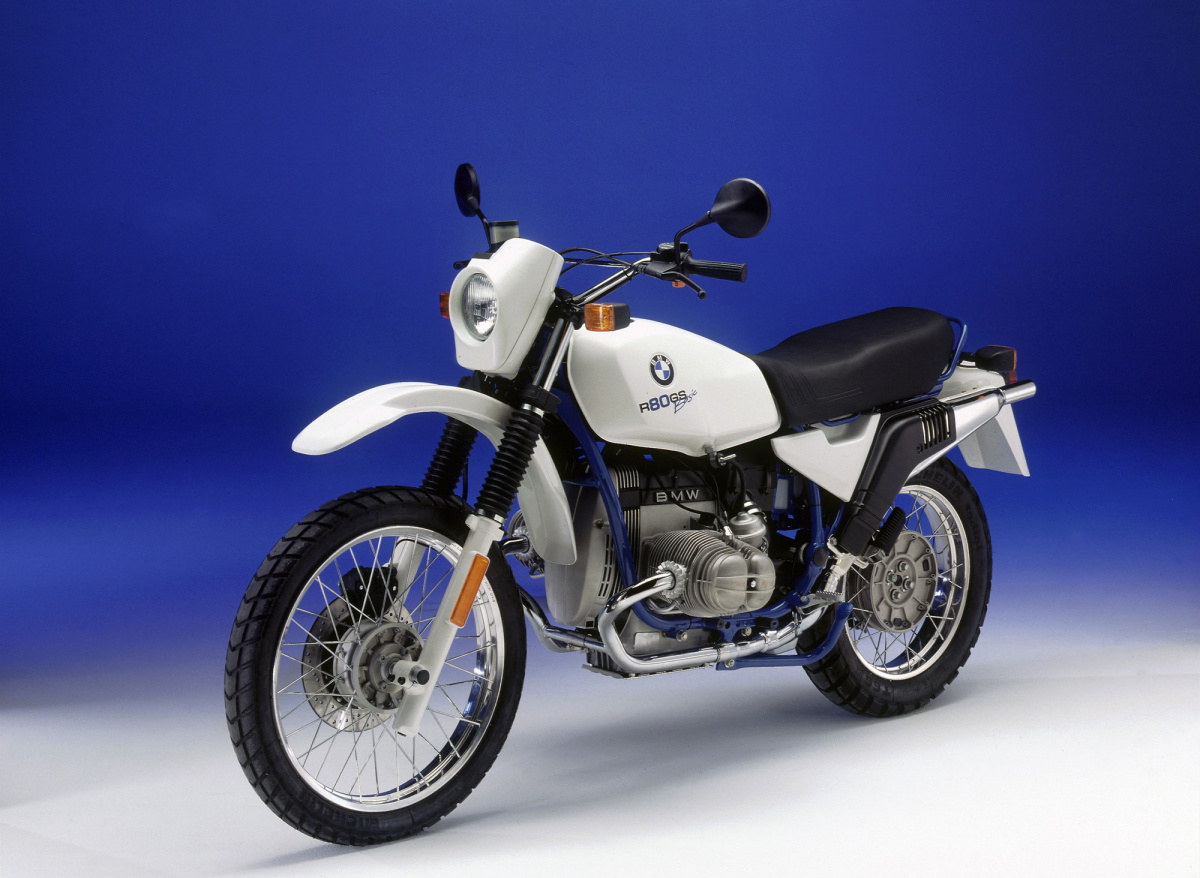
The 1997 R 80 GS Basic in white on a blue frame was produced with the older air-cooled engine for one year. Photo courtesy BMW Motorrad
1998 BMW R 1100 GS 75th Anniversary Edition
In 1998, to celebrate the 75th year of making motorcycles, BMW released the 1998 BMW R 1100 GS 75th Anniversary edition. It had a special red, white, and silver color scheme and a wide range of upgraded specs and parts.
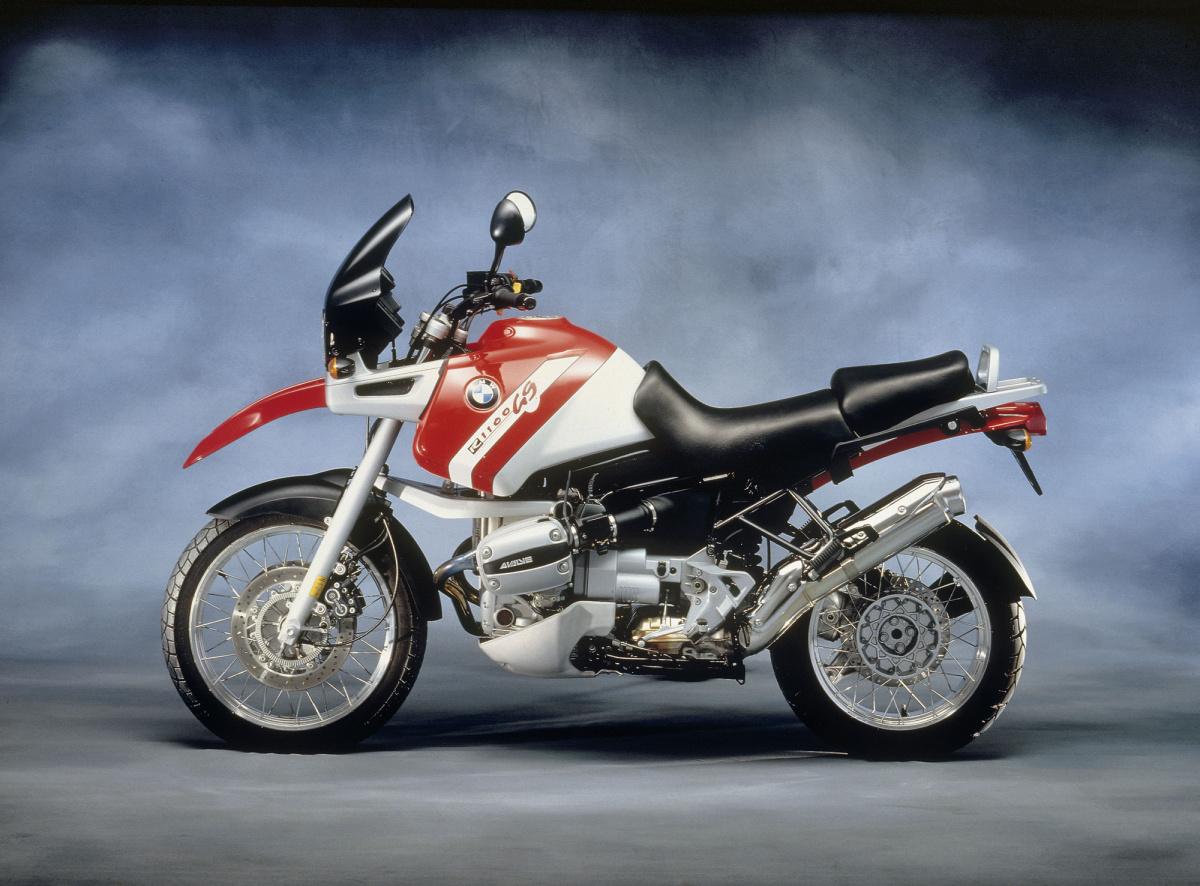
The 1998 BMW R 1100 GS 75th Anniversary in red and white. 750 units were produced, and you can tell this one was a European edition by the dark smoke windscreen; US versions were clear. Photo courtesy BMW Motorrad
1999 BMW R 1150 GS
The 1999 BMW R 1150 GS got a bump in engine size and a redesigned fairing and, in 2002, an adventure package complete with bumblebee graphics an extra-large tank. The bikes were again loaded with performance enhancements and proved that riders thought bigger was better.
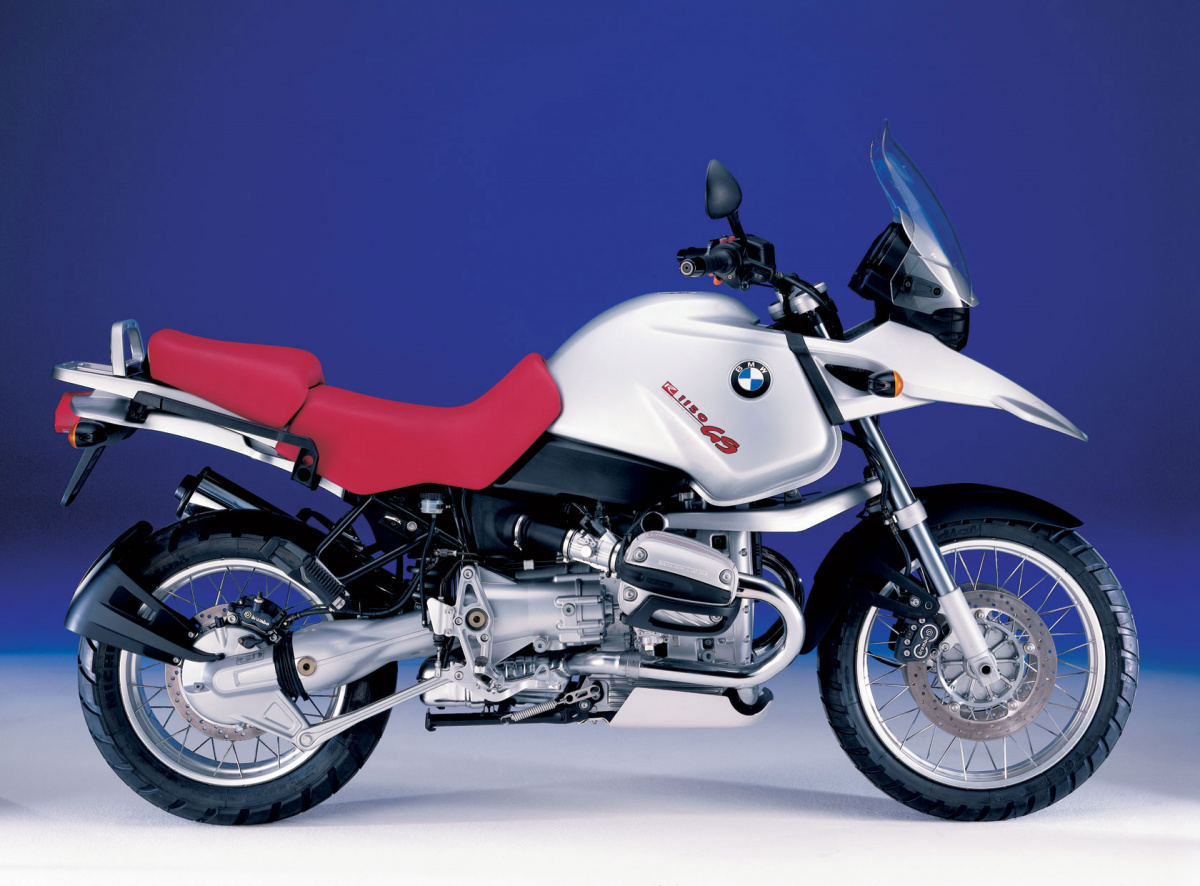
The 1999 BMW R 1150 GS debuted a larger engine and a nod to the original R 80 GS’s red saddle. Shown here in Titanium Silver Metallic, the first time a metallic was used on a GS.
2000 BMW F 650 GS
In the spring of 2000, after dumping the R850 GS, BMW riders found themselves wanting a smaller GS option. BMW turned to their existing F 650 and made two GS versions of it, the F 650GS and a limited edition F 650 GS Dakar, both with fresh styling upgrades. The Dakar edition was so popular it went into regular production to 2007.
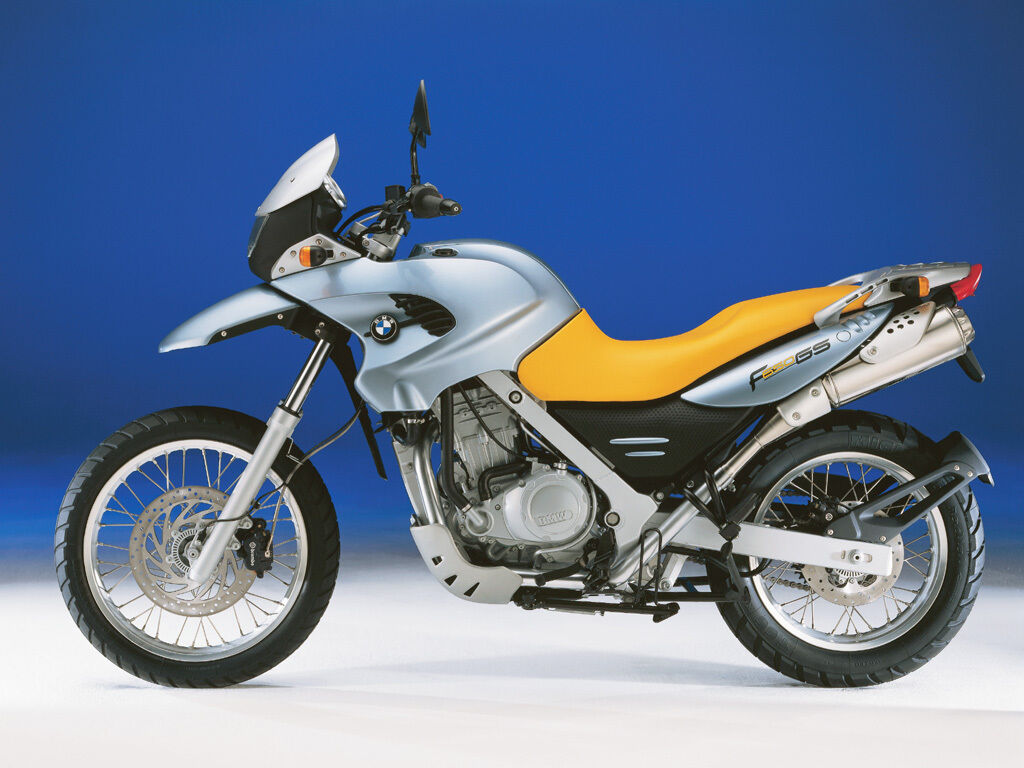
The 2000 BMW F 650 GS shown here with a yellow saddle.
2002 BMW R 1150 GS Adventure
In 2002 BMW released the BMW R 1150 GS in an “adventure” trim in white and blue, silver and red, or, of course, bumblebee. The bike cemented its place as the motorcycle for globetrotting adventurers when Ewan McGregor and Charley Boorman rode them around the world for a BBC series called Long Way Round.
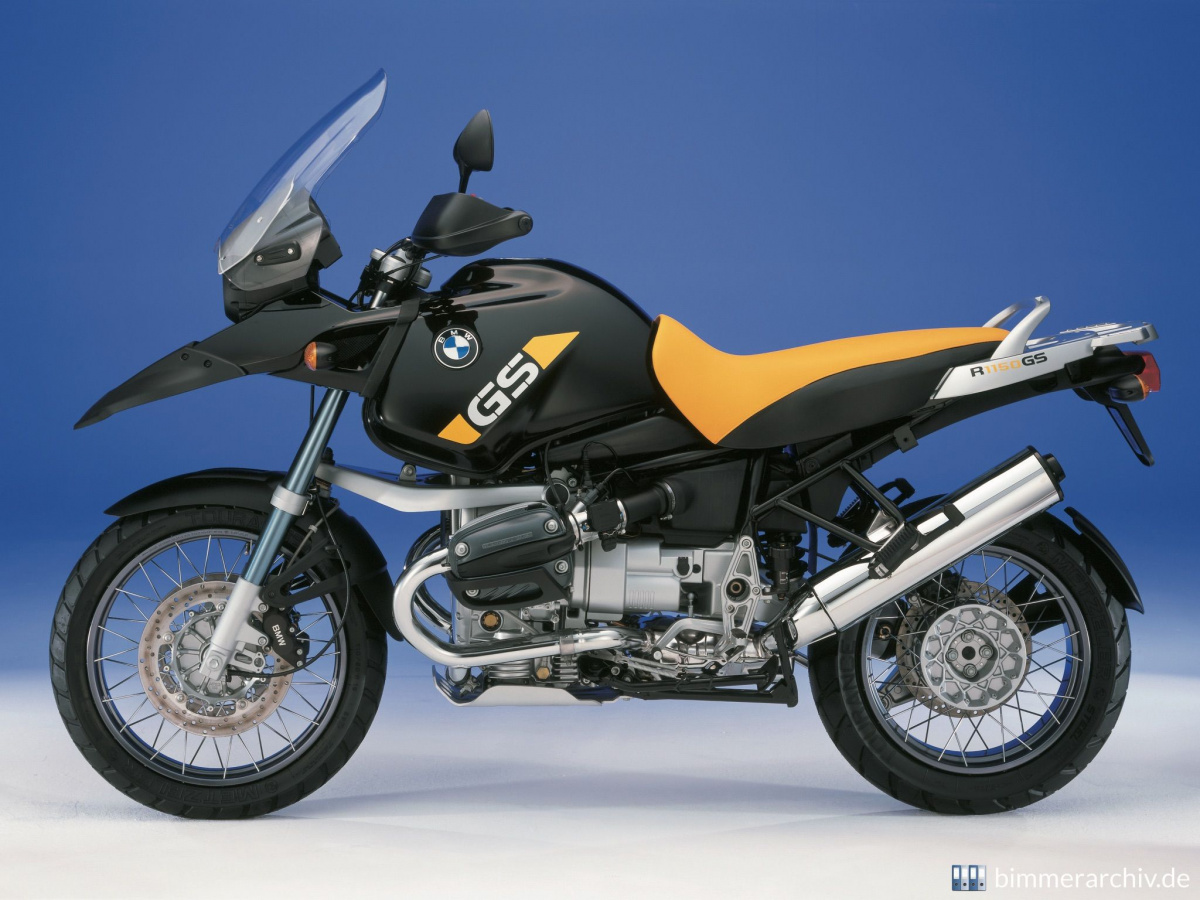
The 2002 BMW R 1150 GS Adventure made globetrotting via motorcycle a worldwide interest.
2004 BMW R 1200 GS
Bigger engines with more power are always welcome, but the additional weight, especially for an off-road bike, is not. In the summer of 2004 BMW presented the first BMW R 1200 GS—a more powerful, but impressively lighter version of the R1150 GS. Styling helped the bike look leaner, and the model reigned through five generations and an Adventure version through 2018.
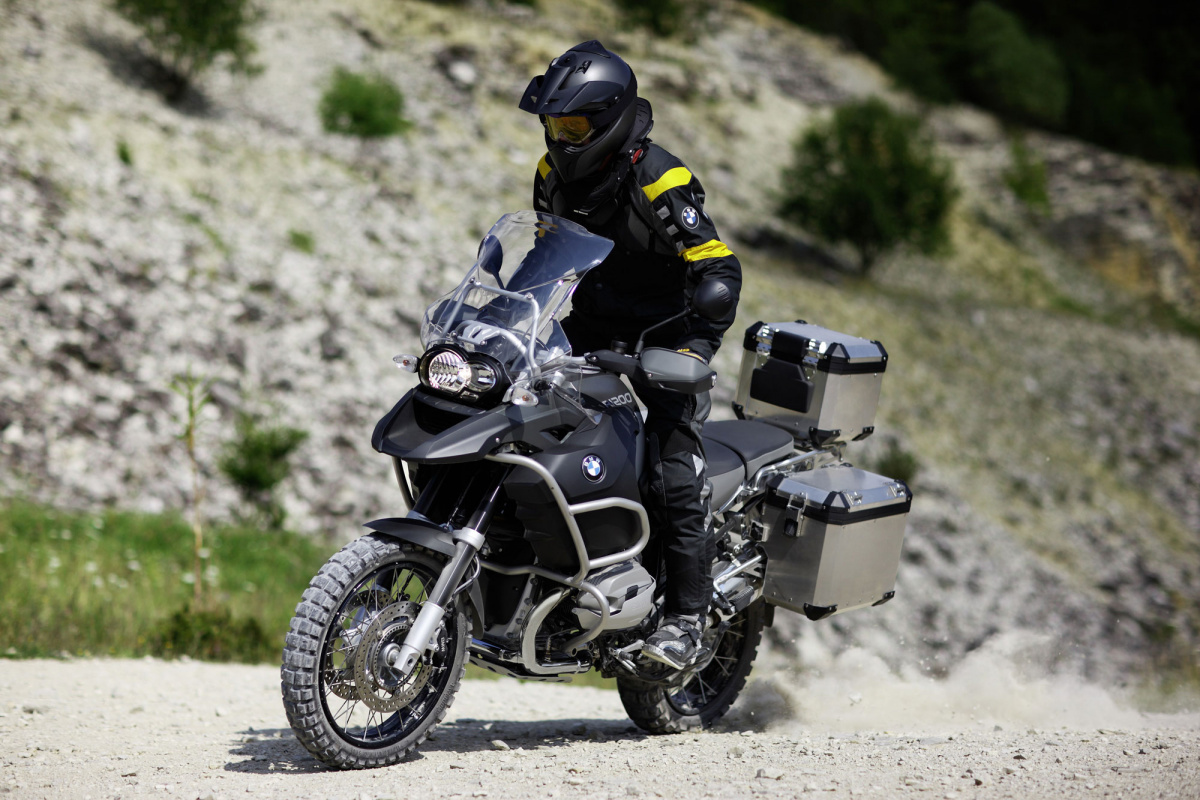
The BMW R 1200 GS (note the rider in a bumblebee suit) offered more power with 8% less engine weight.
2016 BMW G 310 GS
In 2016, as is tradition, BMW again launched a smaller GS, this time much smaller—the entry-level 2016 BMW G 310 GS.
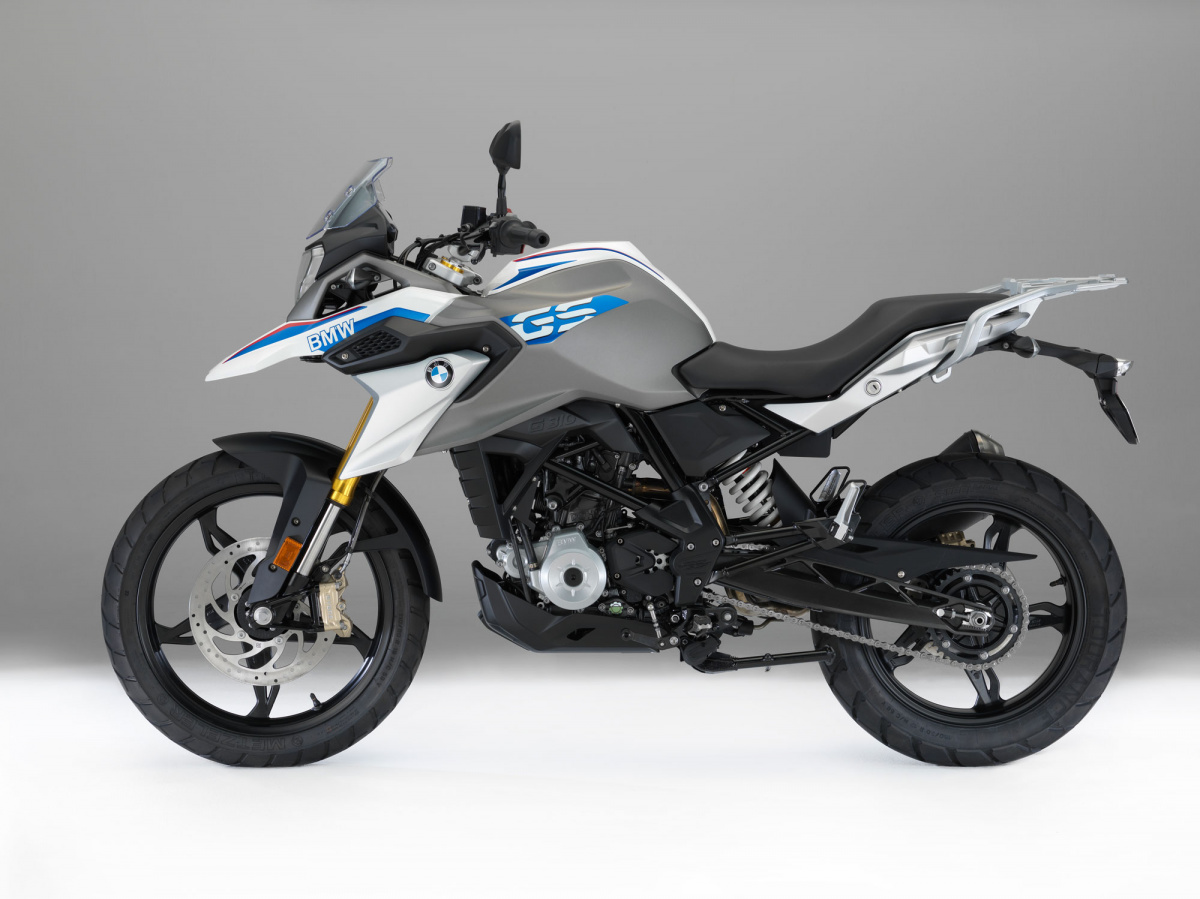
The BMW 310 GS was designed as an entry into the GS universe.
The bike was smartly designed to create a visual similarity with the bigger GS models and was manufactured in India by TVS Motor Company.
- A designer sketches the BMW 310 GS.
- Rendering of the BMW 310 GS.
2016 BMW R nineT Urban G/S
In the same year the R nineT Urban G/S was released with styling heavily inspired by the original R80 G/S.
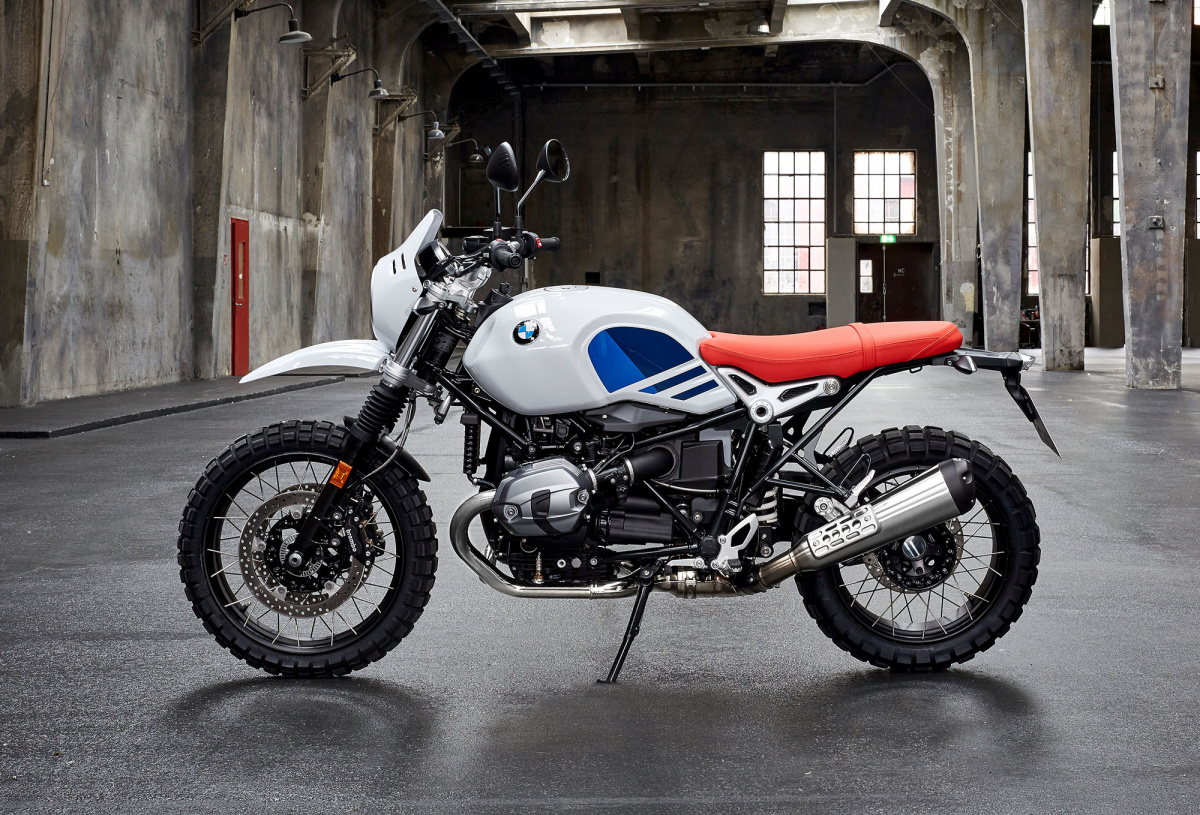
The R nineT Urban G/S clearly drew on the original R 80 G/S for its good looks. Photo courtesy BMW Motorrad.
2017 F 750 GS & F 850 GS
In 2017 a completely redesigned version of the F 750 GS and the F 850 GS were released. There was now truly a GS for everyone.
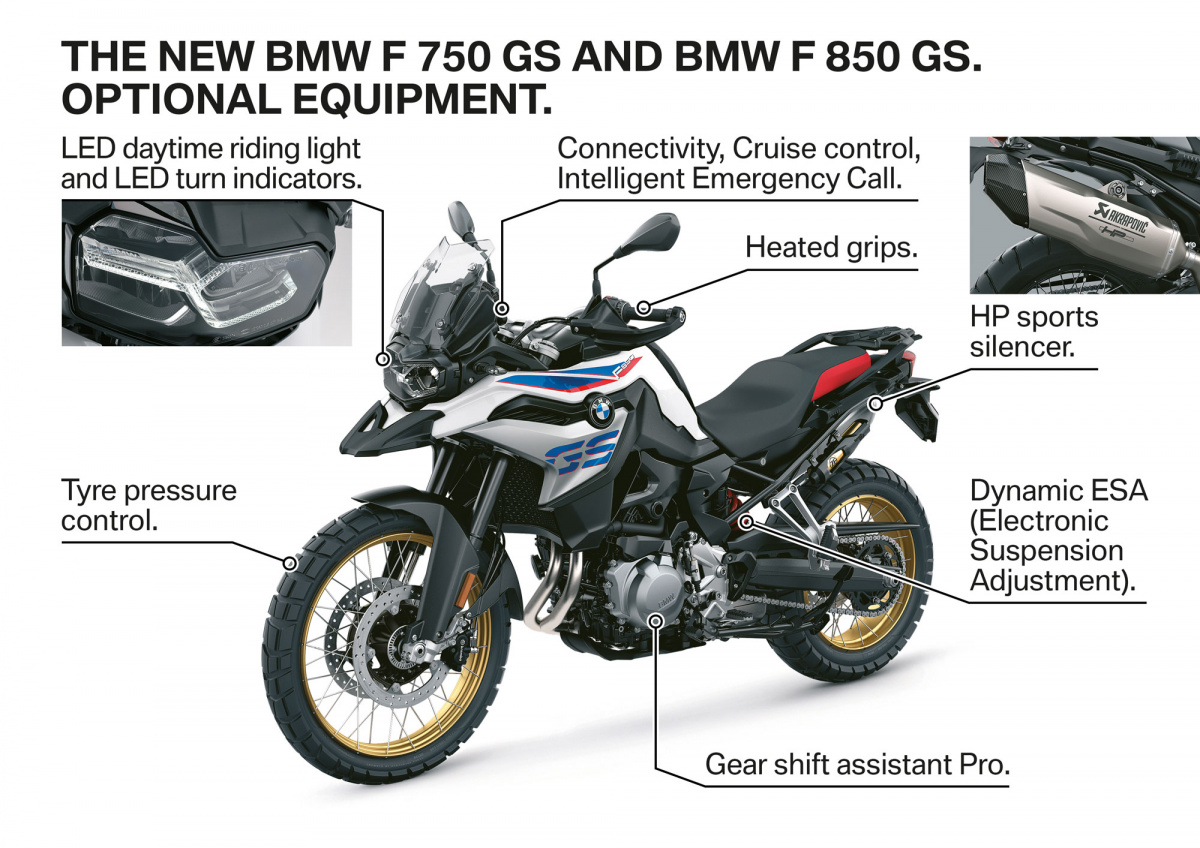
What do you do with a successful motorcycle? Upgrade parts and equipment. Photo courtesy BMW Motorrad
2018 BMW R 1250 GS
In 2018 BMW upped the engine size again, launching the BMW R 1250 GS with a heavier, but technically superior version to the R 1250.
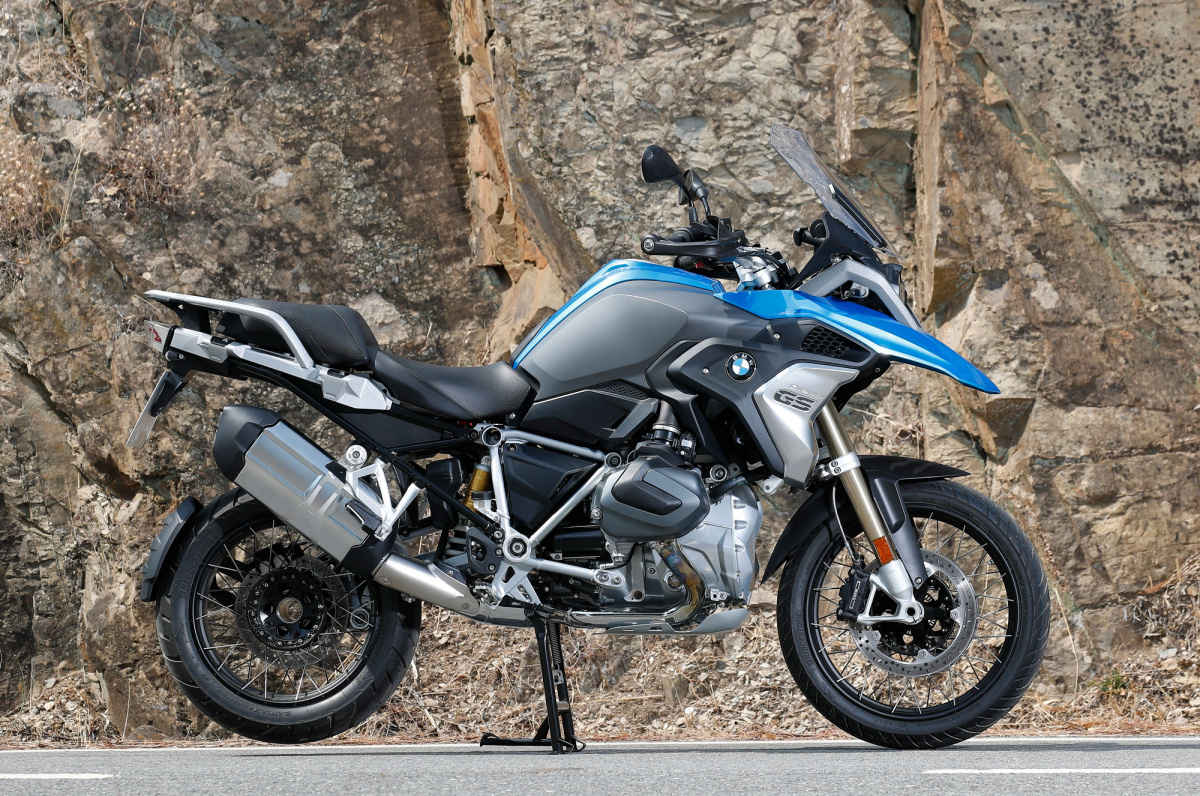
The BMW R 1250 GS shown here in Cosmic blue metallic. Photo courtesy BMW Motorrad.
40 Years of BMW GS Models
This year BMW celebrates 40 years of its widely successful GS line and created a “40 Years of GS Edition” for the BMW F 750 GS, F 850 GS, and F 850 GS Adventure.
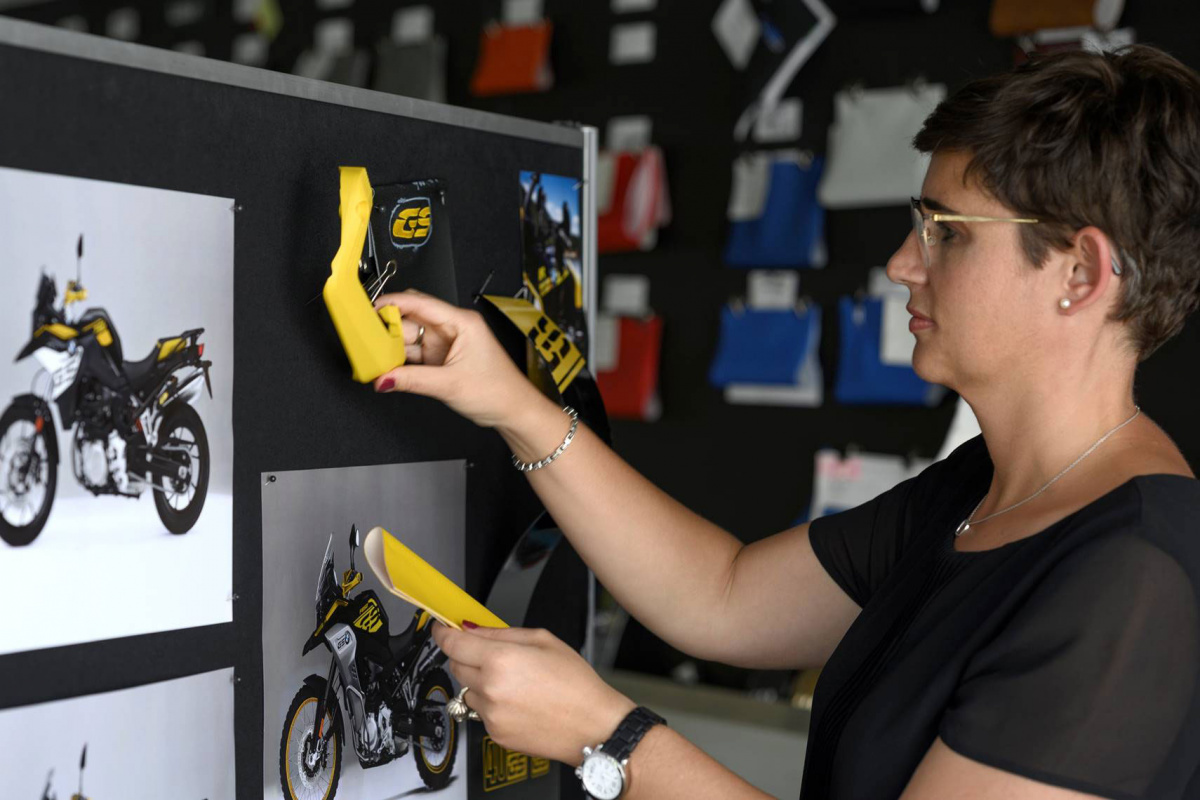
BMW Designer Kerstin Heinrich working on studies for the “40 Years” GS models. Photo by BMW Motorrad for Sixtysix
To spearhead the graphics package to celebrate the anniversary, BMW turned to in-house Color, Trim, and Graphics Designer Kerstin Heinrich, who has been with the company since 2001.
- BMW F 850 GS Adventure as designed by Kerstin.
- Kerstin Heinrich, Color, Trim and Graphics Designer at BMW Motorrad Design.
Beginning in the fall of 2018 under the management of Edgar Heinrich (head of BMW Motorrad Design) and Volker Schrem (head of Color, Trim, and Graphics), Kerstin began researching the 40th anniversary graphics plans.
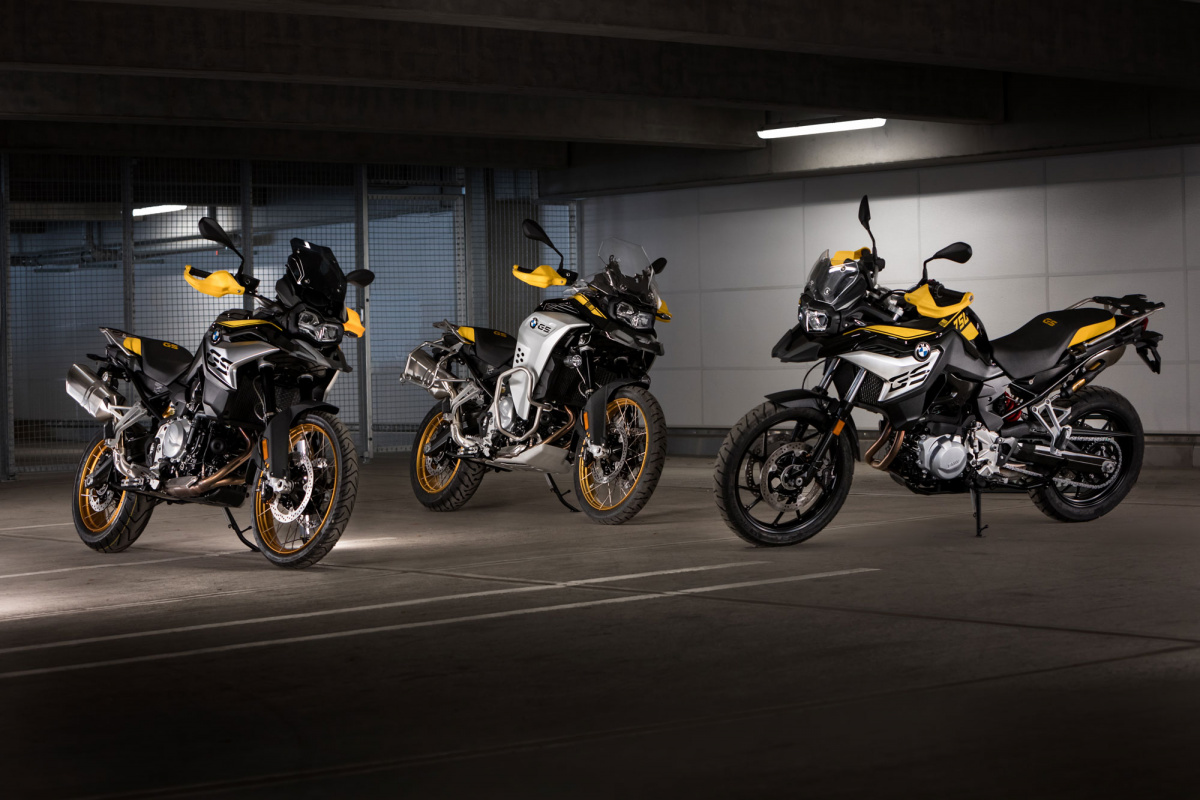
The BMW R 850 GS, R 850 GS Adventure, and R 750 GS “40 Years GS Editions.”
The black and yellow “bumblebee” design’s long history at BMW made sense as a starting point for the new look and feel. In addition to computer renderings, they began making screen prints and applying them with tape directly to prototype bikes.
The result modernizes the look while keeping a cohesive feel throughout the GS lineage. The new GS motorcycles will be in showrooms soon.
